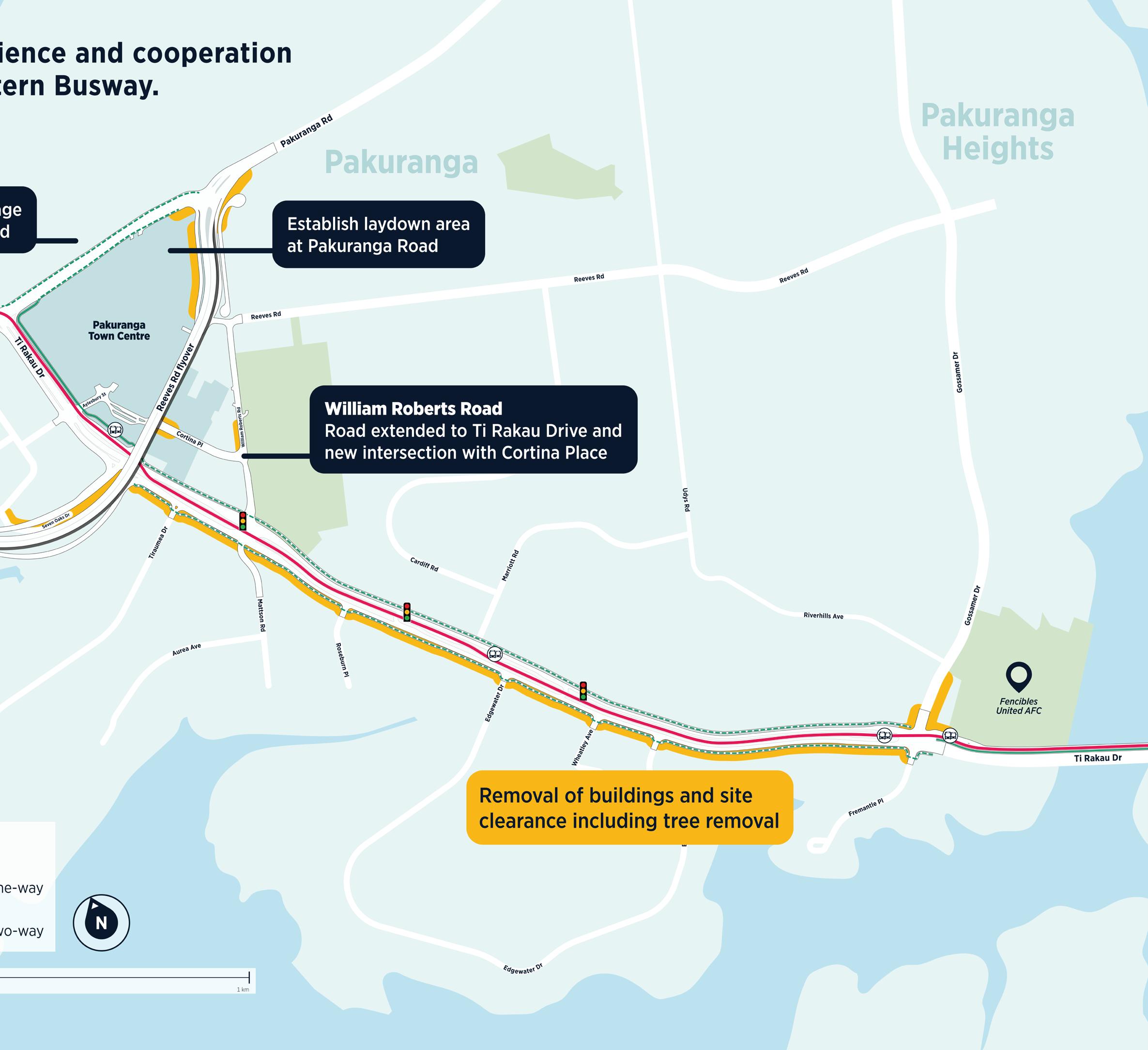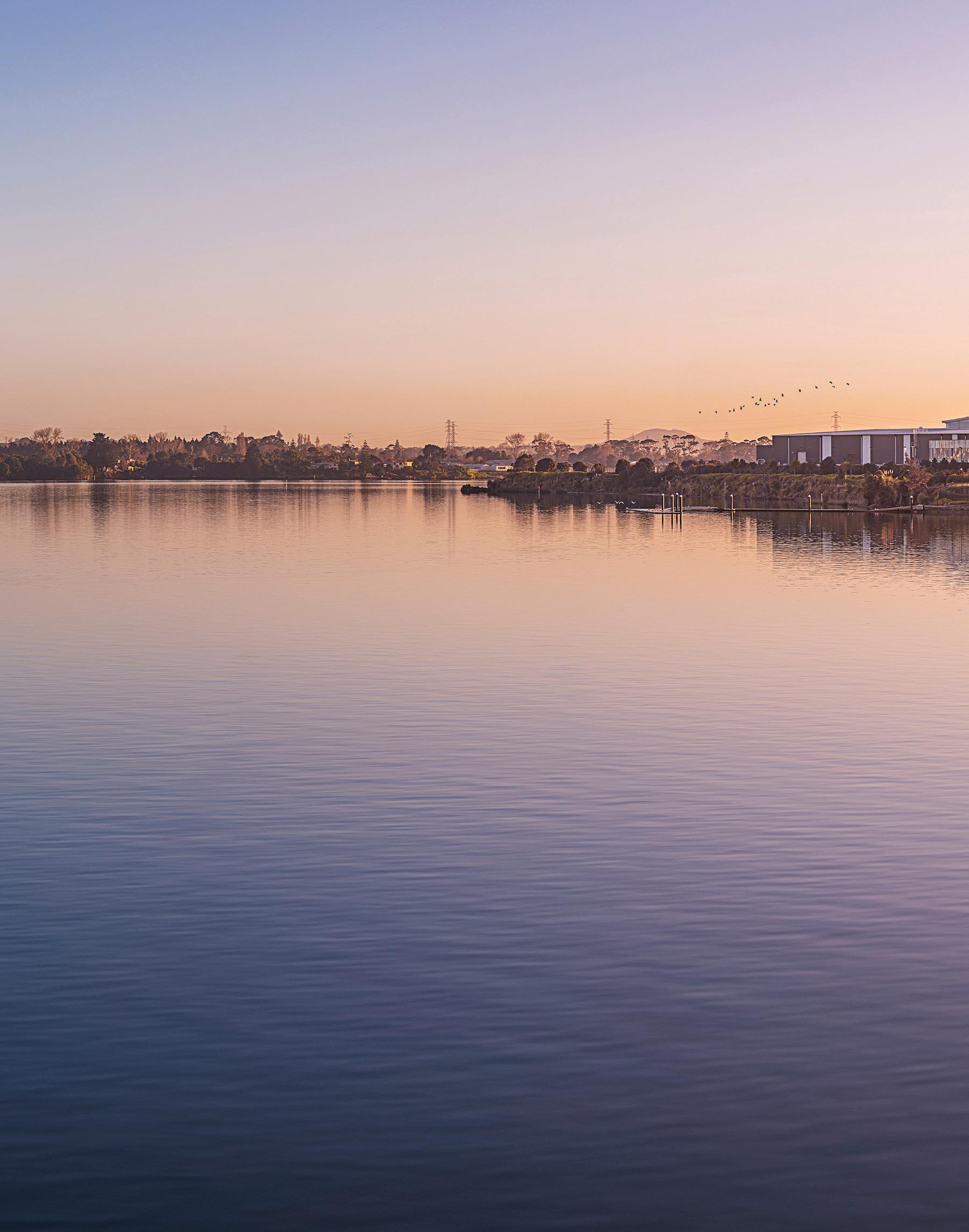
How you frame the future affects how well you plan for it.


How you frame the future affects how well you plan for it.

Association) is here to make it easier to do business; working alongside business leaders and property owners in the region on security, advocacy, development and growth.

6

East Tāmaki News:
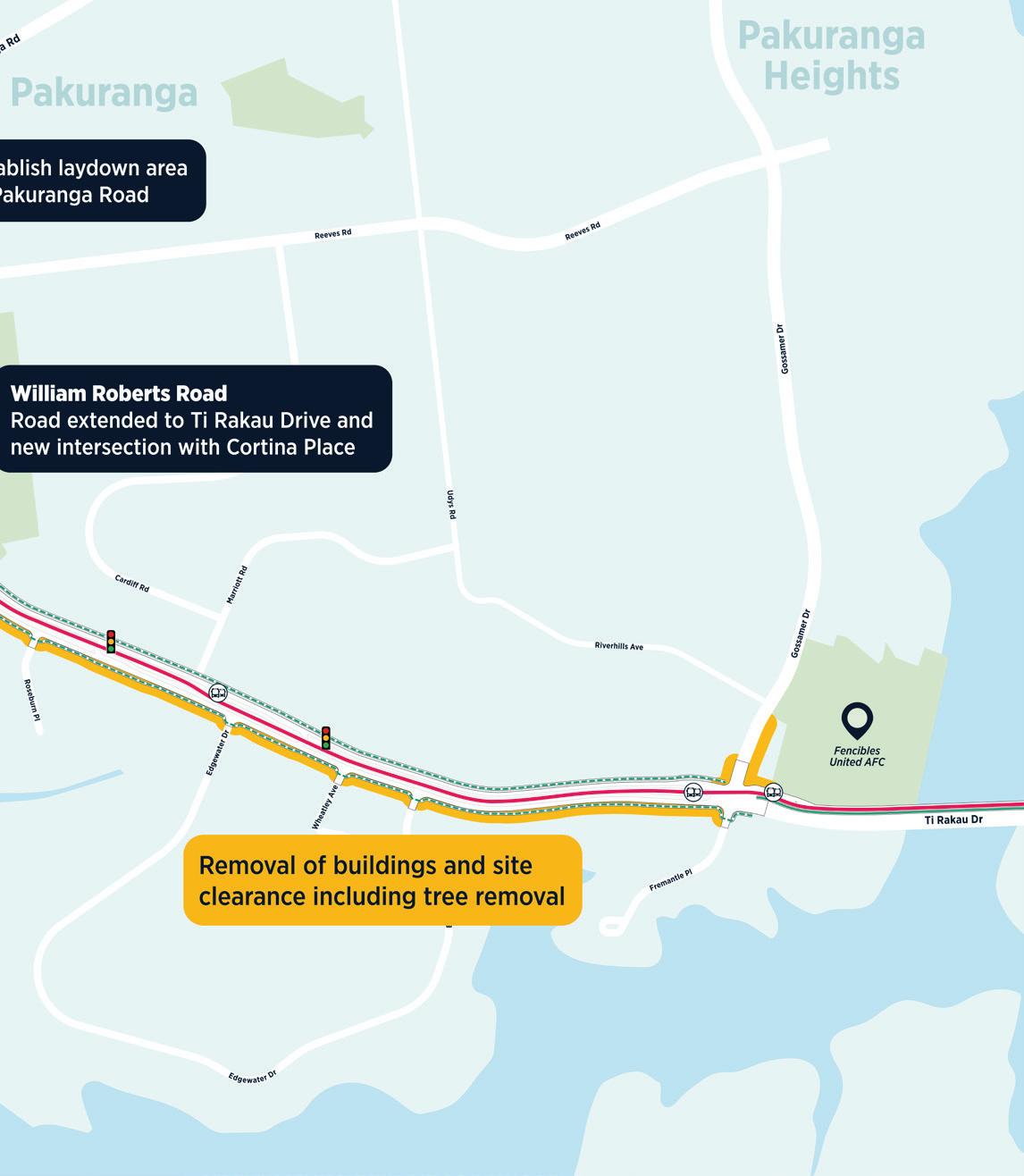
10 Theme feature: An
Work
Mahi/Strength
14 Business profile: Cosmed Group Industrial Ltd.


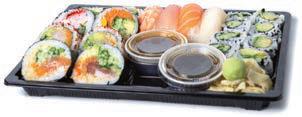
15 Business profile: Zinc Group NZ
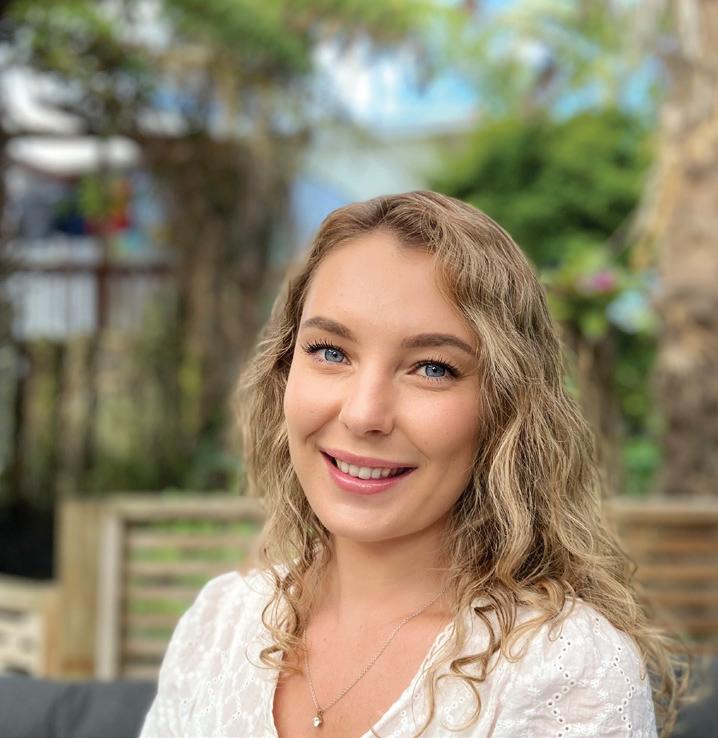
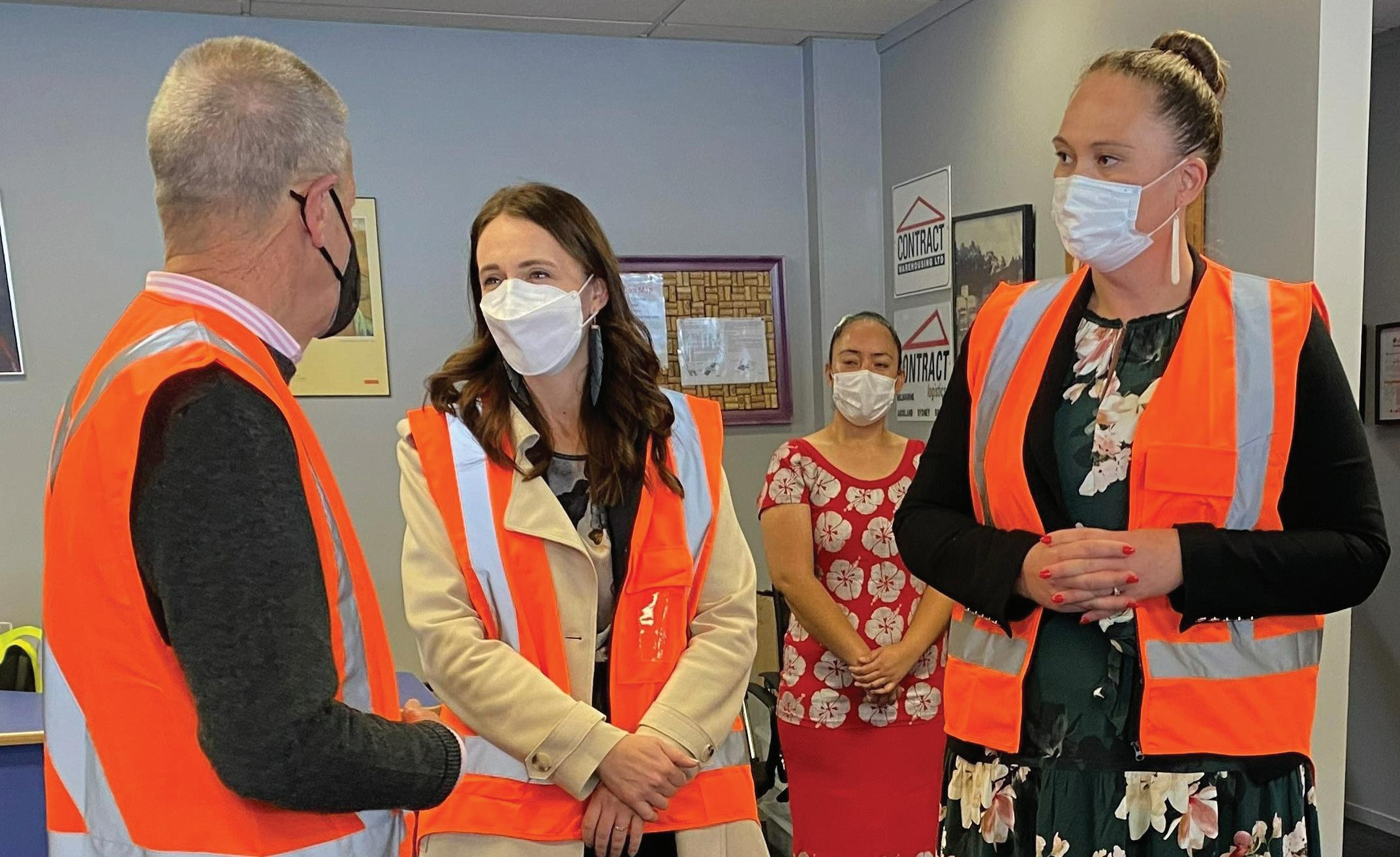
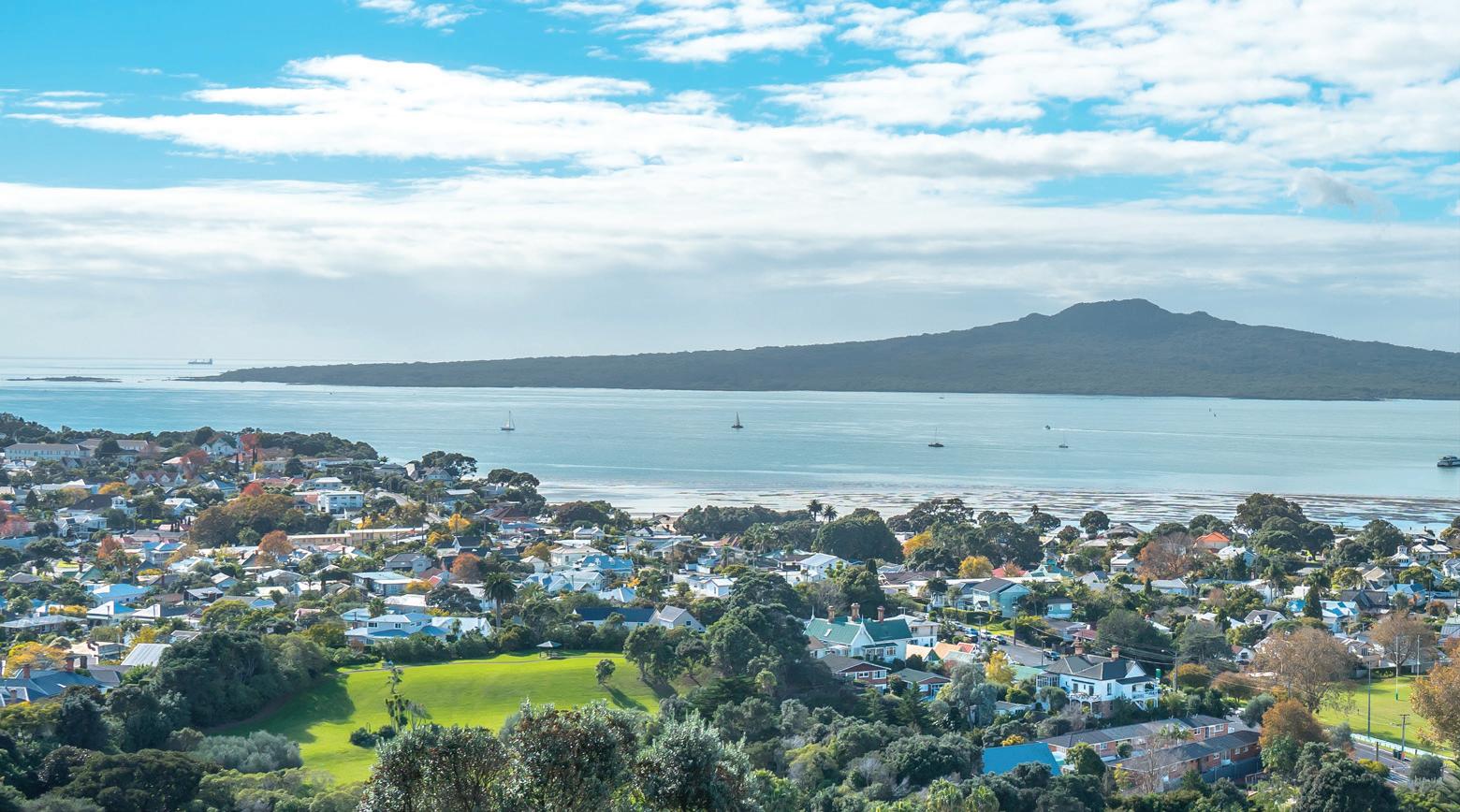
18 Health and Wellbeing:

tough times
people
20 Business Resilience:
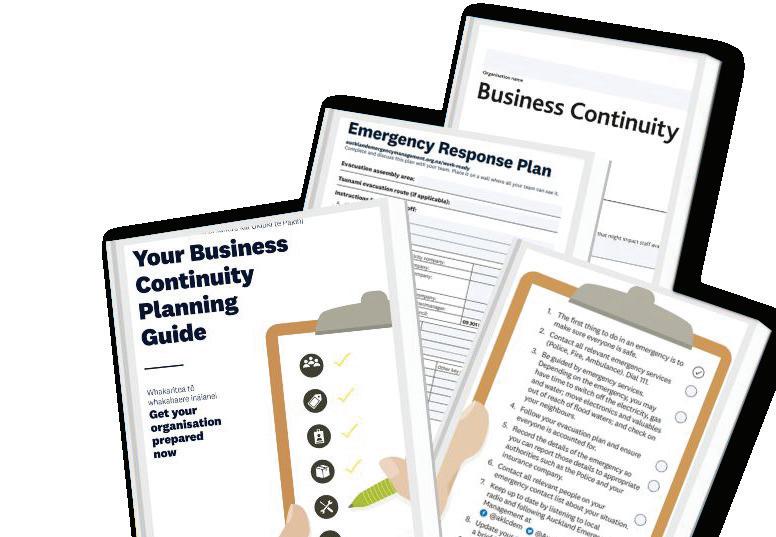
you prepared?
Management
Crime Prevention Update
Investment: Forsyth Barr


24 Advocacy: Workplace

–
26 Sustainability:
Sustainability:
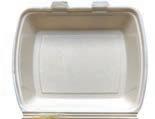
East Tāmaki
Busway

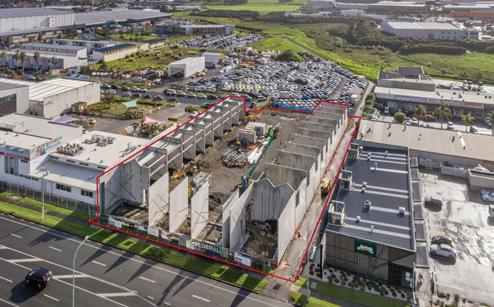

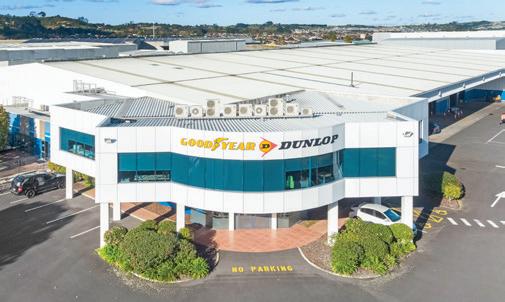
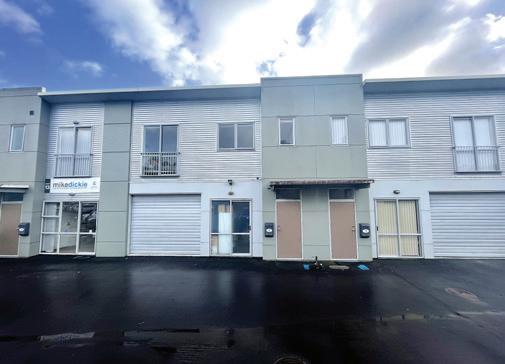
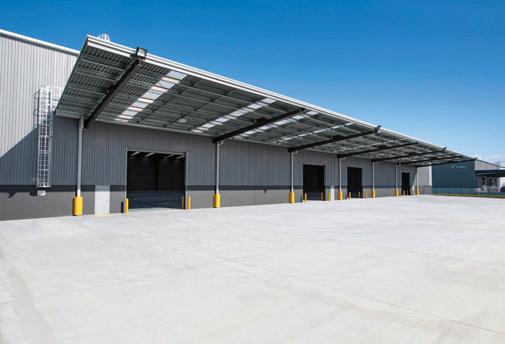

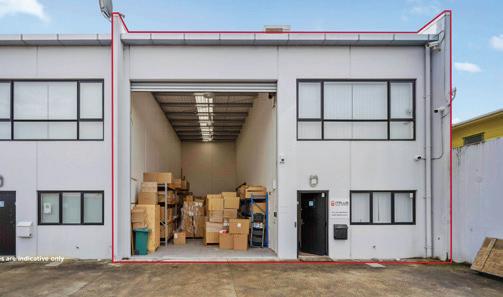
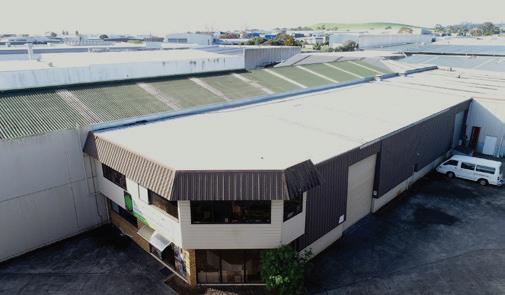



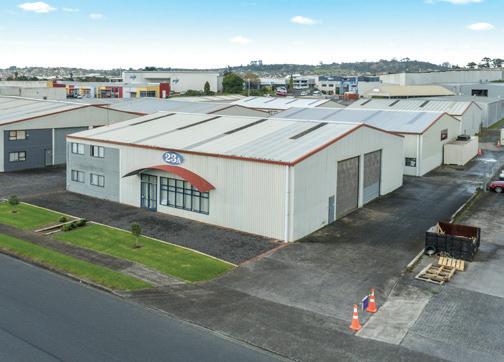




We are proud to be bringing you the Spring edition of Business in East Tāmaki, with ‘an eye to the future’. We see business adjusting to our current environment with a new status quo; that means living with Covid in the community, increased staff sickness and new disease strains being brought across the now almost fully open borders. We are all universally affected by, and adjusting to, supply chain lead times on inventory and delivery schedules, and awaiting the impact of immigration settings easing to open the tight employment market.
Looking forward, and thanks to the funding support we have received from Howick Local Board, we are providing a number of training and learning events which include some to upskill your workforce and fill skill gaps, and others focusing on equipping your teams with resilience and wellbeing tools to ride through uncertainty.
With the lifting of restrictions, we have started sponsored networking events again. ‘Meet Your Neighbours’ events are proving very popular - we’re definitely showing a thirst for re-connecting. Special thanks to those events sponsors so far, Business East Tāmaki and Steel & Tube.
Our Annual Survey enables Business East Tāmaki to get input on your current and future business issues. This input enables the team to focus on delivering content, projects, activities and training that’s
relevant to your future business challenges. The results of this survey are featured on pages six and seven. From the survey results, it’s clear that most businesses see waste and the need for waste solutions as a clear sustainability goal, and they’d like to see Business East Tāmaki focusing more effort in this area.
There is a very small but persistent group who fail to see the relevance of climate change, so we will continue to focus our conversations around tangible sustainability improvements you can make in your business today, and in the coming investment period. It’s not only the day-today challenges, such as getting your plastic waste into recycling and out of landfill, we’ll be looking at sustainable energy improvements for your business, such as:
• What EVs are available in the commercial vehicle space
• What infrastructure you will need to consider when deploying an EV fleet
• Case studies looking at businesses that have deployed solar power
• Where should a business consider hydrogen as an energy source?
Enjoy reading this issue.
Brendan Kelly Chairman, Business East Tāmaki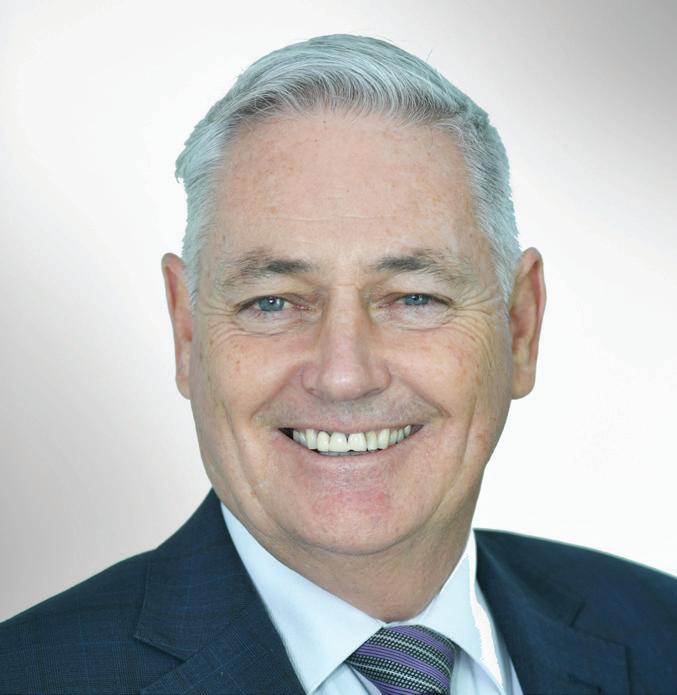
Every year, we ask for our members’ input into what will be the most useful mix of activities, support services and initiatives that we can provide you with over the course of the next 12 months.
This year's survey was conducted online and promoted over a two-week period via our e-newsletters, website and social media. If you did not get an opportunity to take part in the survey, you are welcome to contact the Business East Tāmaki team at any time with your feedback.
This year, we asked several questions around sustainability and the climate to get a view as to how we can best support our members and deliver on our vision to be recognised as the most environmentally sustainable and innovative business district.

6.
what areas
Leadership
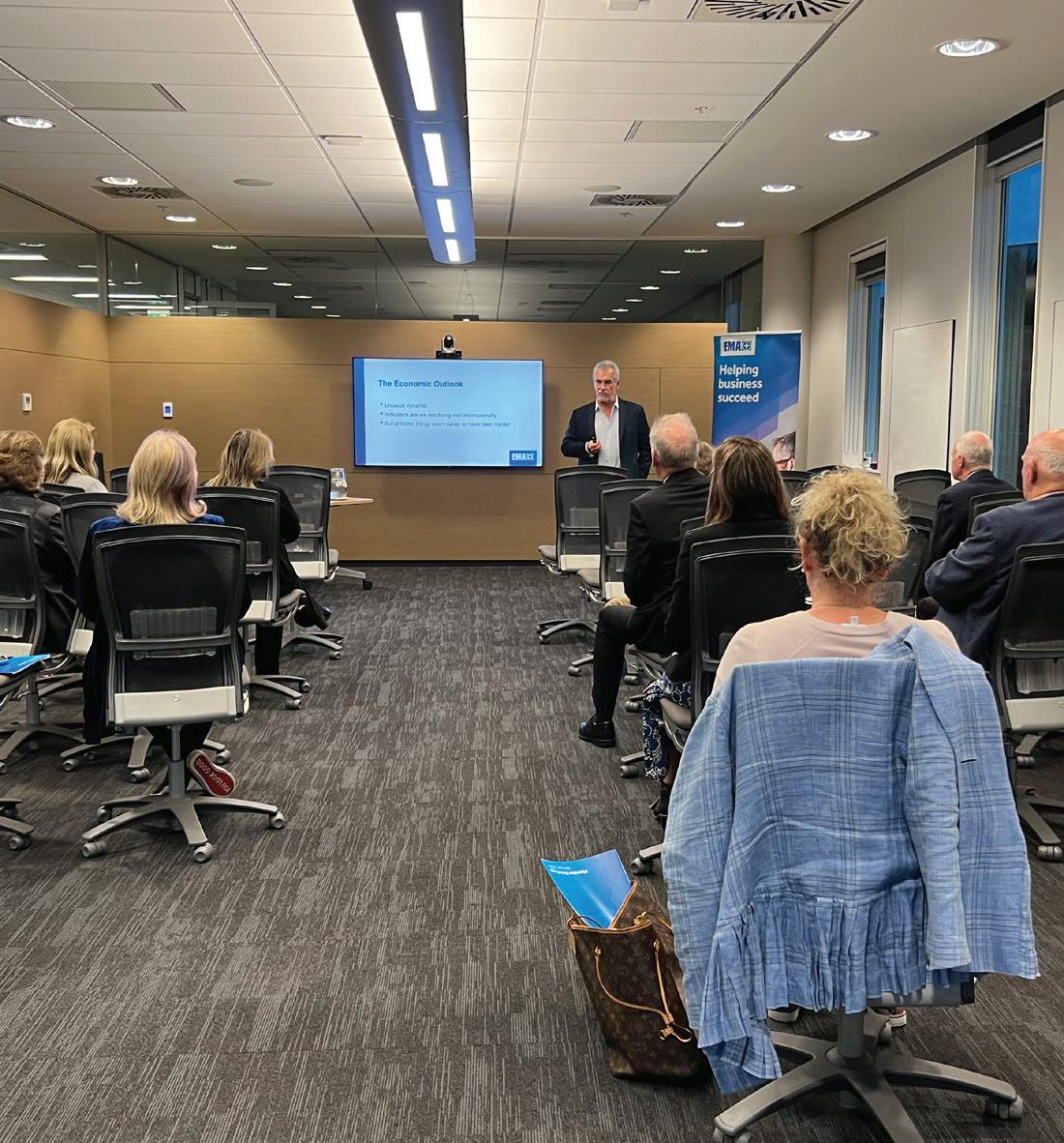
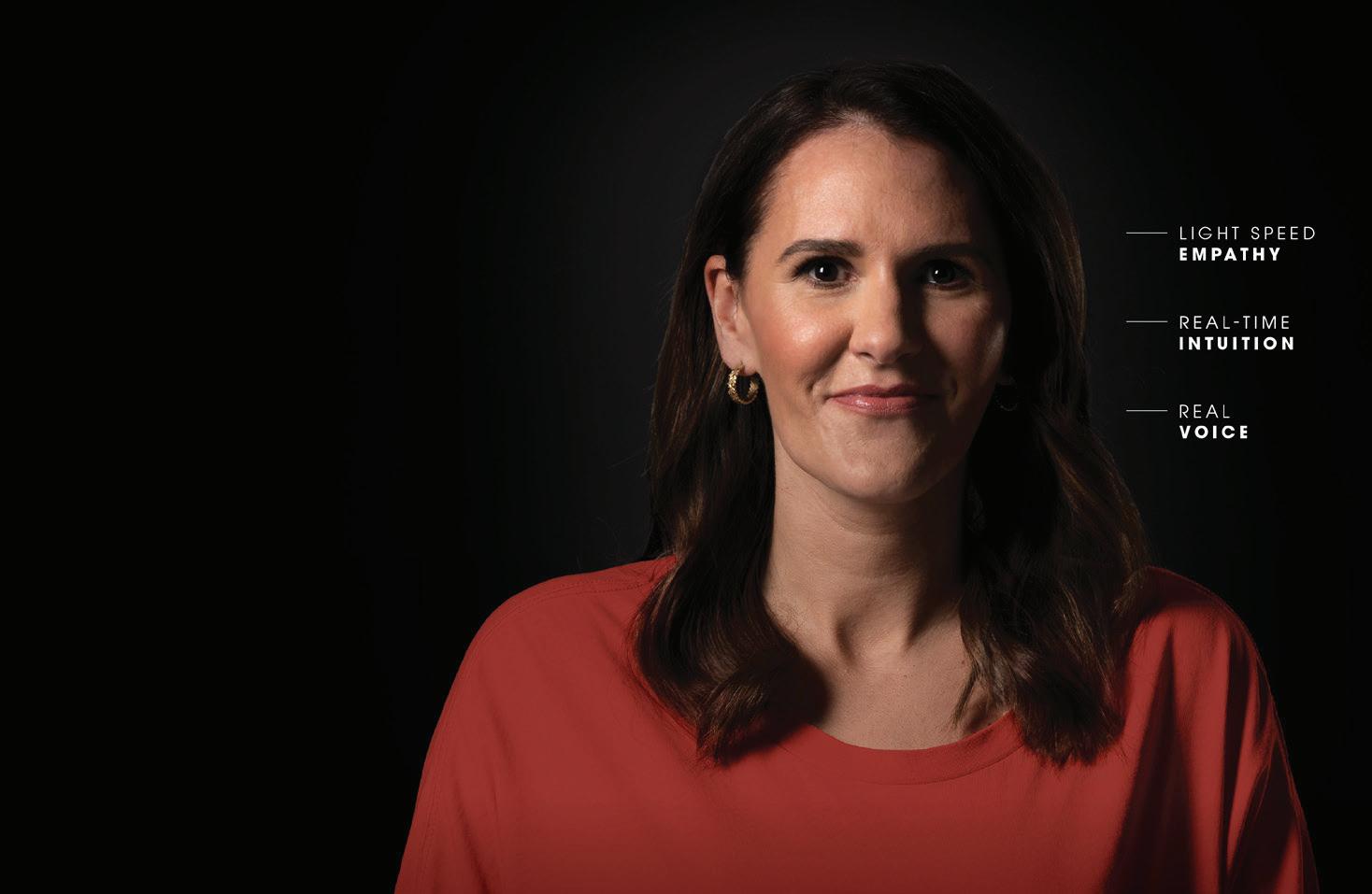
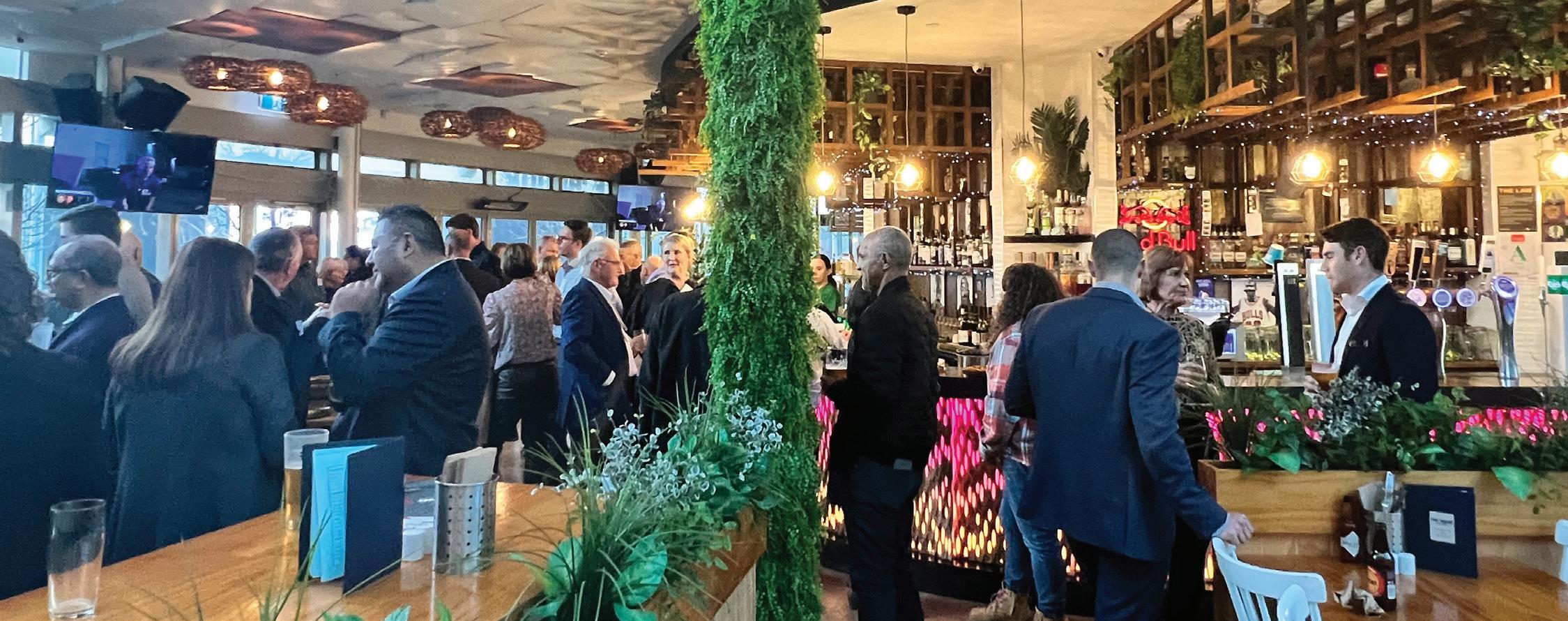
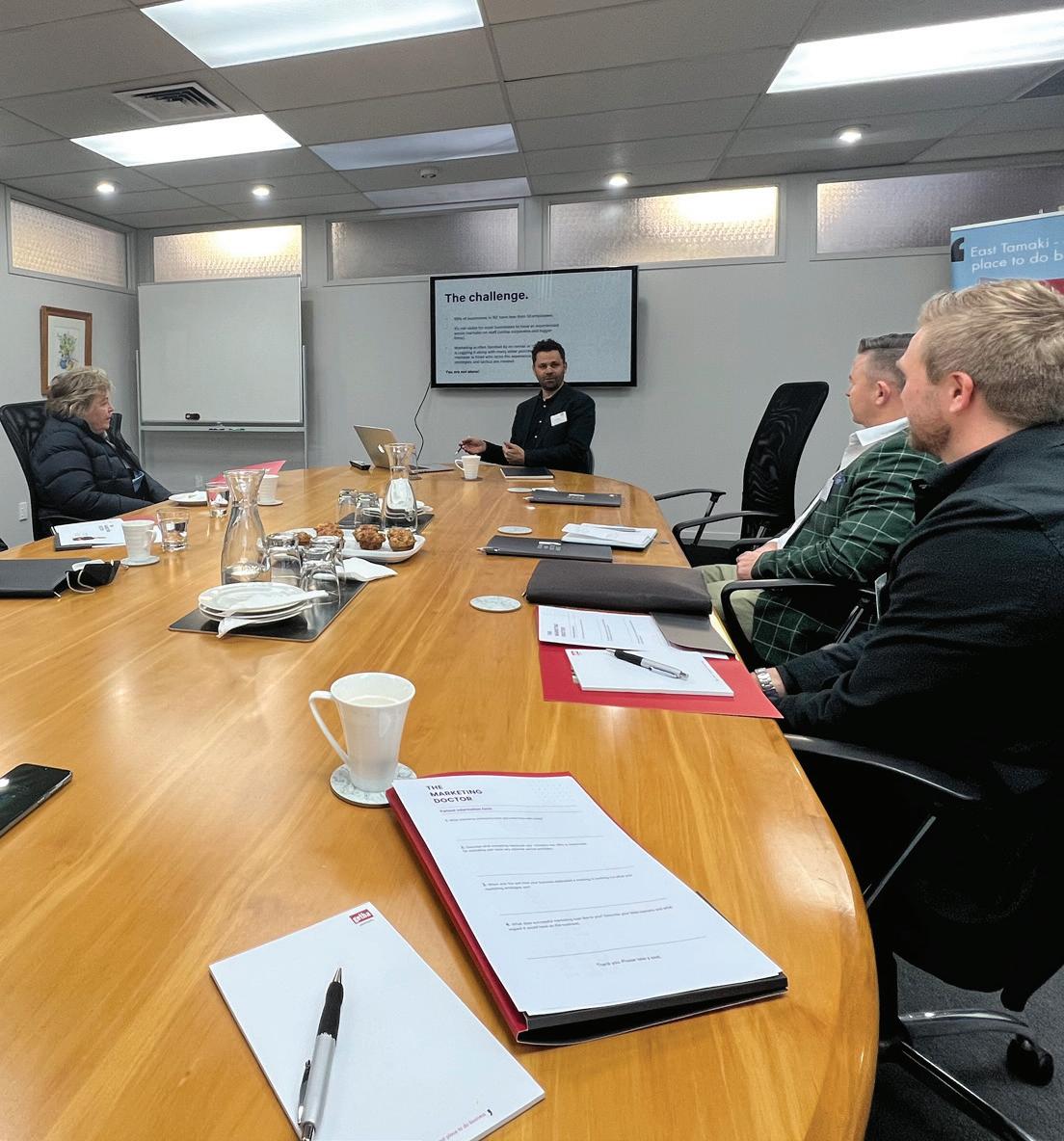 EMA Briefing 29th June, BNZ Partners Centre
EMA Briefing 29th June, BNZ Partners Centre
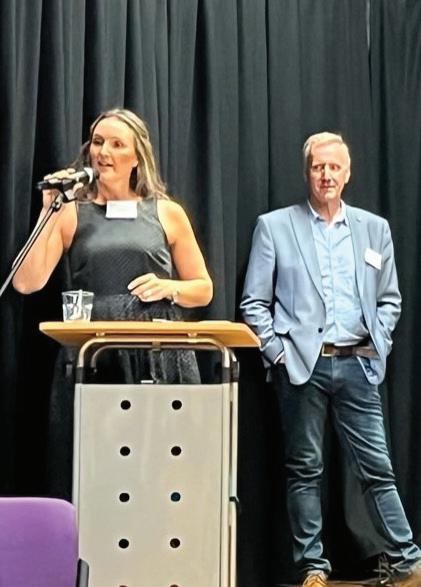
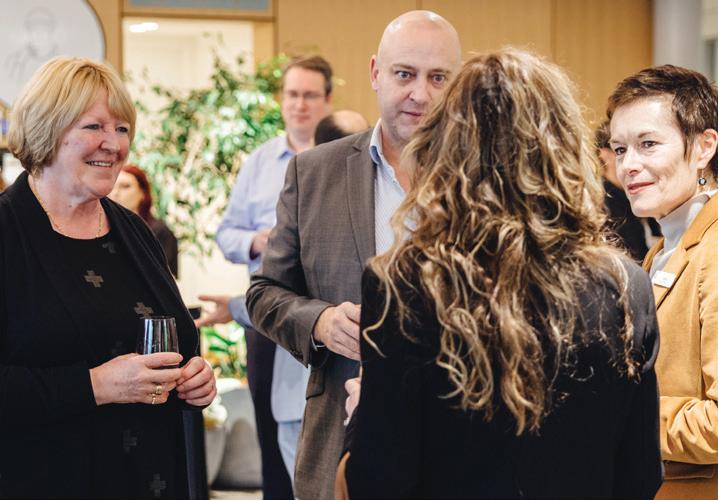
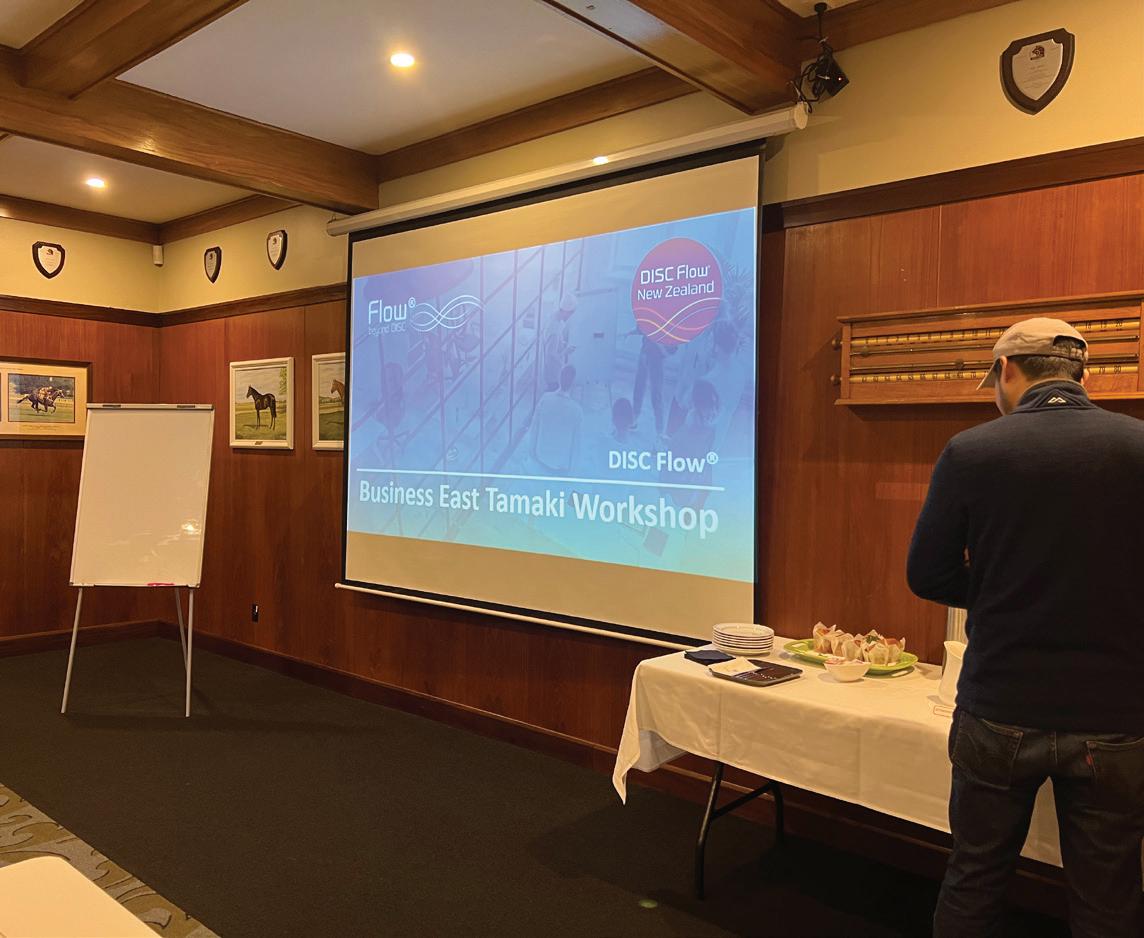
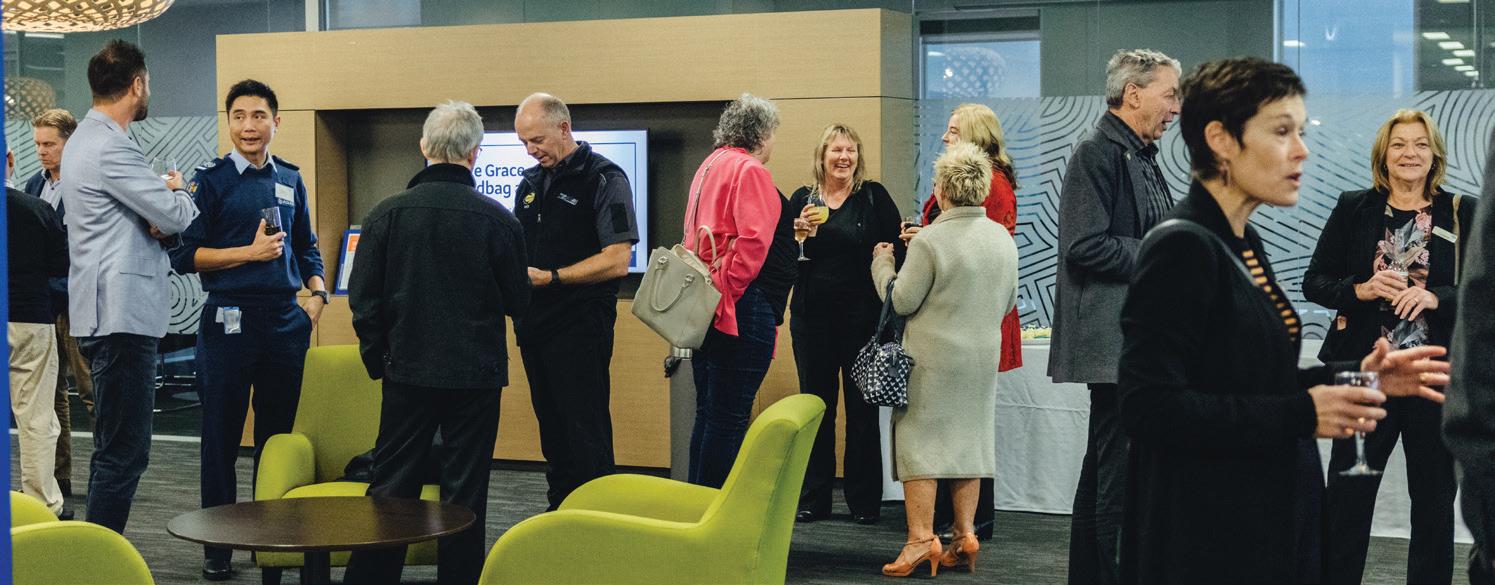


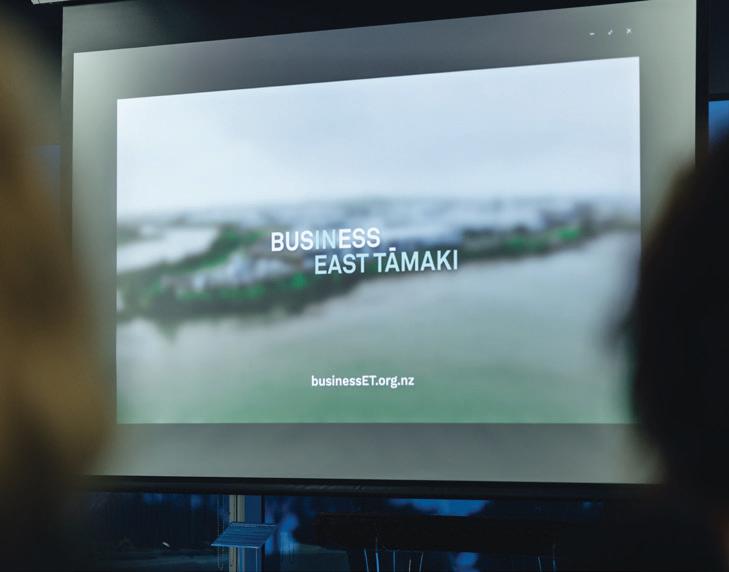


Prime Minister’s visit highlights the success of the Mana in Mahi programme
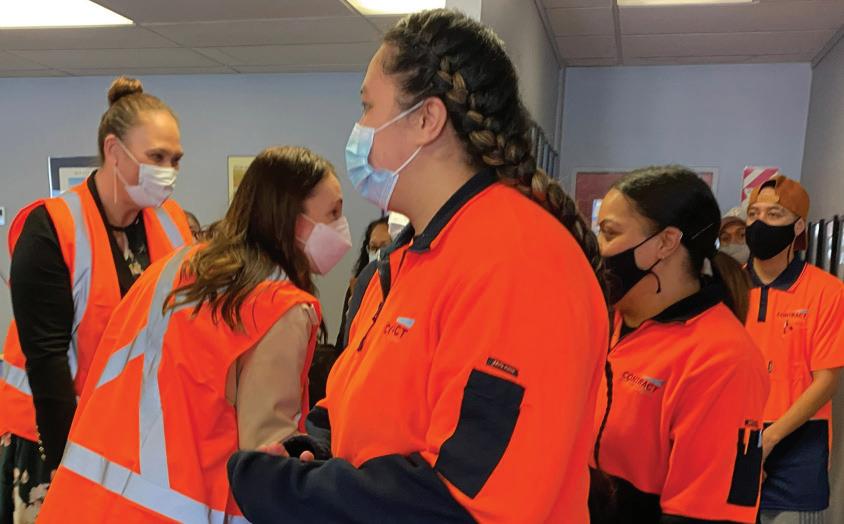
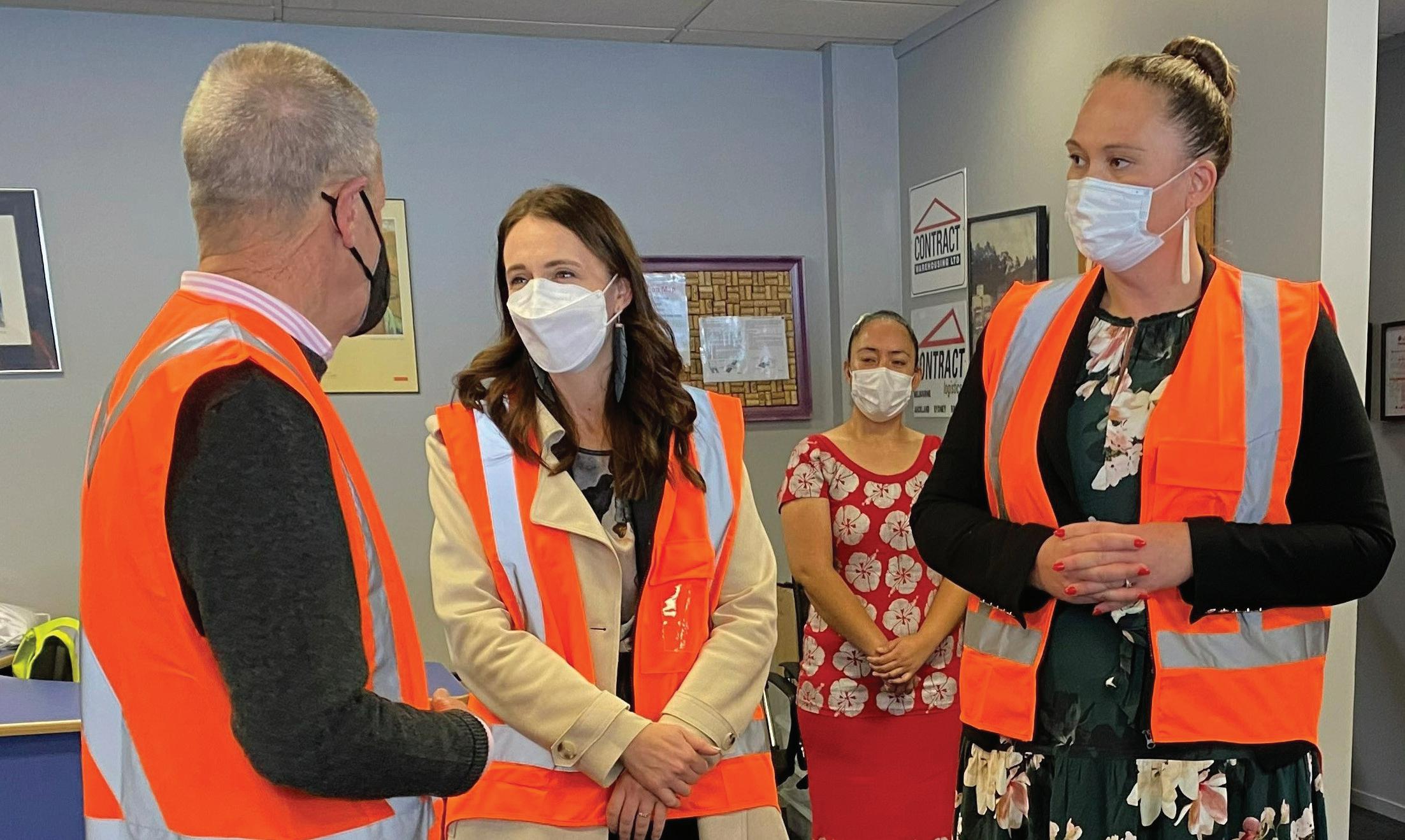
In August, Prime Minister Jacinda Ardern and Minister for Social Development and Employment, Carmel Sepuloni, visited Contract Warehousing in Allens Road, East Tāmaki, to mark the milestone of over 5,000 participants in Mana in Mahi, the Ministry of Social Development’s (MSD) youth employment programme.
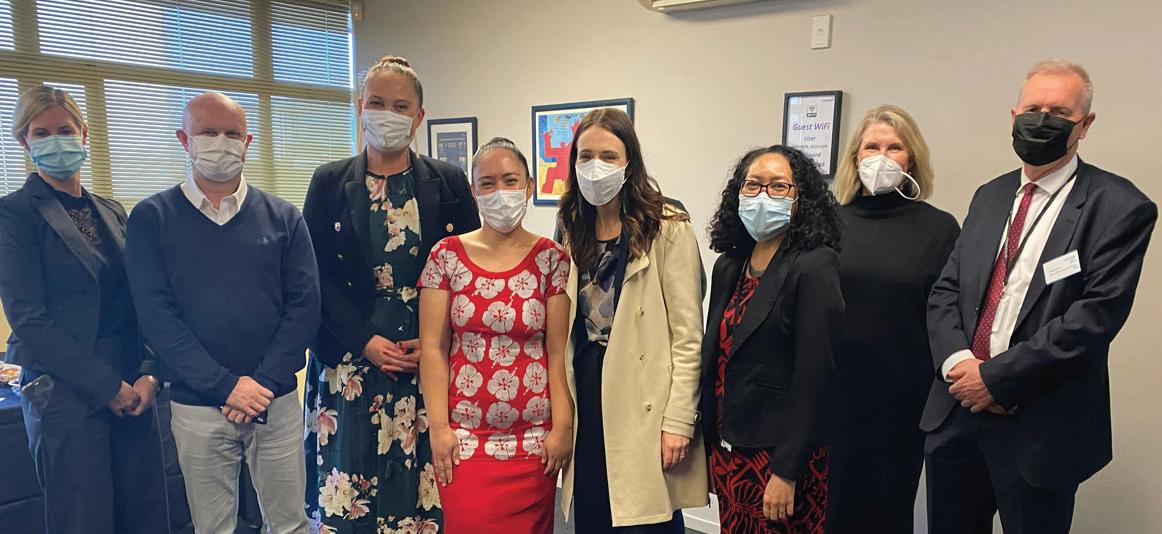
Rod Giles at Contract Warehousing has developed a strong relationship with MSD over the past 45 years and recruits the majority of his new hires through them. It’s one of many businesses that have taken on Mana in Mahi participants, with a particular focus on supporting Māori and Pacific people into employment.
“Since its inception, employers and providers have gone above and beyond to help job seekers gain the confidence, skills and qualifications to kick-start their careers,” Minister Sepuloni said. In his speech at the event, Founder and Managing Director, Rod Giles, said, “I have experienced many variations of incentives for both employers and the unemployed. In my experience, the Mana in Mahi scheme is currently the most successful to date. Both for myself as an employer, and I believe, for the candidates that I have employed.
“Both employers and employees need to buy into the scheme. The employer must accept they are taking on a person who, in most cases, has had a poor education, resulting in a poor start to life, poor self-esteem, too many job changes, and wrong jobs that have given them little chance to develop and an opportunity to grow, often not due to any fault of their own. Each change often brings another period of unemployment, resulting in a lack of money and a greater decline in self-esteem. They have every reason to feel beaten up in a way many of us have never experienced, and it shows.”
Rod said that employers must put in the extra effort, as the person they are taking on does need support and encouragement. “It’s assisting these guys to understand that what they are being offered is a chance to change their direction in a positive manner. From day one on the job, they will be learning
new skills and can expect to see positive results.”
Minister Sepuloni said that the scheme is investing in the first steps that are needed for them to not only work but support their whānau, and contribute to their communities and the businesses they work with.
“Government cannot do this alone however, which is why Mana in Mahi recognises the role employers play in taking on job seekers by supporting them with the costs of pre-employment and on-the-job training costs. It’s a win-win, Mana in Mahi helps us to develop the next generation of our workforce while helping employers grow their businesses at the same time.”
• Mana in Mahi reaches a milestone surpassing 5,000 participants

• 75% of participants who had been on a benefit for two or more years haven’t gone back onto a benefit
• 89% who have a training pathway are working towards a qualification at NZQA level 3 or higher
• Nearly half (44%) are Māori or Pacific, and 64% are aged under 24 years.
To find out more about employing someone through Mana in Mahi read all about it on Page 13.
Founder and Managing Director, Rod Giles, knows what it’s like to struggle financially. From managing a farm at 16, running a milk round which barely paid the bills, having a lawn mowing business on the side to make ends meet and losing nearly all his business when the financial crisis struck in 2008. “I really do understand how tough it can be,” he says. It’s therefore not surprising that Rod has supported so many young people through the Mana in Mahi programme.
Rod started up Contract Warehousing in 1978, and despite enormous setbacks along the way, it has grown to what it is today – a large, award-winning, reputable logistics and warehousing business, handling the storage, distribution and administration needs of numerous clients, based both in New Zealand and off-shore.
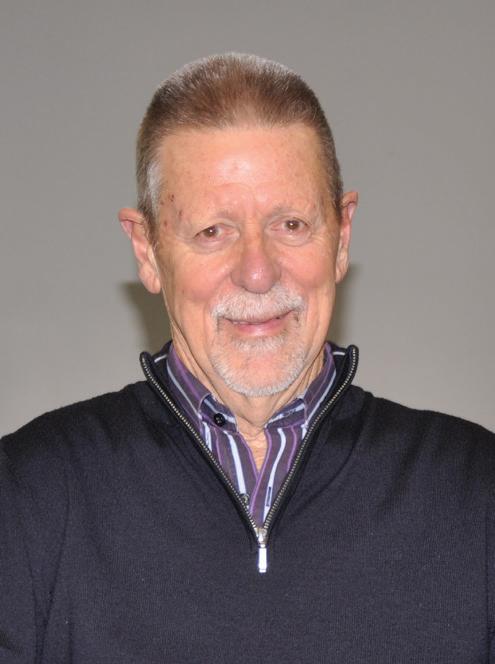

To say that Rod is driven is an understatement. He admits he’s hands-on and likes to continue being involved with his team and company. However, he says he is “trying to slow down” and stick to the strategic side of the business, leaving the day to day running of the business to his four managers.
Rod is immensely proud of his business and the team that runs it. “We’re like a big family and we support each other”.
Hayrinna Siuhega and Adrient Tuita’s lives have been turned around with the financial stability of permanent work. Adrient’s goal was to “get off the benefit” to learn skills and be able to support her young daughter. Hayrinna has been working at Contract Warehousing for nearly three years now; the 28 year-old was an Early Childhood Educator but could not find regular, fulltime work. While she says she’s comfortable in the job now, her goal is to eventually train as a Primary School teacher.
• Keep an eye on each candidate’s progress, encouraging them all along the path.
• It’s not “employ and leave them to it.” Put the effort in from day one for you both to win, and positive results will show up early.
• The employee is expected to turn up to work, for eight hours every day, as they are part of a team, and team does not mean “me”.
• To be able to read, count and write correctly as they are accountable at every point.
• Make certain that they understand they will be paid every week, and that they are learning a skill for life. They should understand they have a choice about how they live now they’re receiving a regular income
• While at Contract Warehousing Ltd, they obtain their fork hoist licenses, and their Approved Person certificate under the MPI (Ministry for Primary Industries).
• In addition, they gain their Diploma in Warehousing, Level 3, as an on-the-job training course.
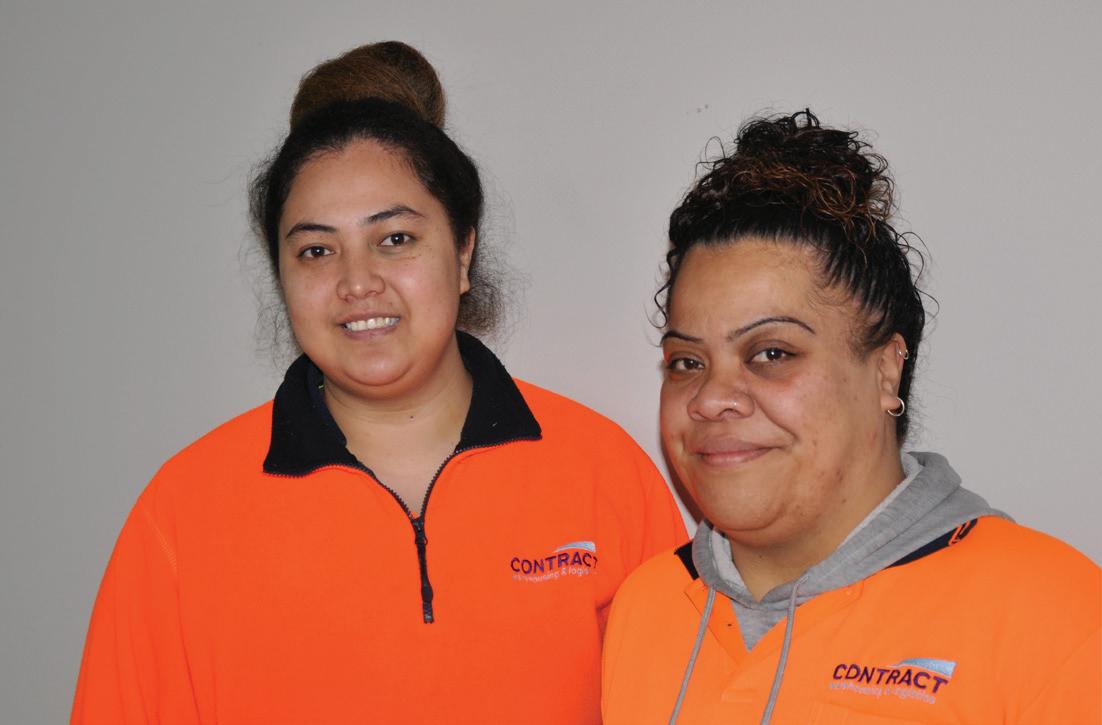
Mana in Mahi – Strength in Work was launched in August 2018 to support job seekers into sustainable and meaningful work.
Run by the Ministry of Social Development, (MSD), Mana in Mahi pays a wage subsidy to participating employers and provides additional supports including funding for preemployment training and pastoral care (for both job seekers and employers).
The job seekers targeted by Mana in Mahi face multiple challenges and require additional support from employers to achieve sustainable employment. Employers must commit to supporting participants through a formal industry training qualification and provide them with sustainable on-going work.
If you're keen to help someone who needs additional support to kickstart a long-term career, MSD helps with funding and wrap-around on-the-job support with an assigned work broker who will have regular on-going contact with you and the employee.
• Mana in Mahi matches employers with those keen to start a career and who need extra support to begin and maintain their work and training journey.
• They work closely with employers to understand what you need and help you recruit the right person for your team.
• They help pay for any pre-employment training the employee might need and provide a wage subsidy to help offset the time you'll need to invest in their training and ongoing development
• Help pay for industry training course fees not already covered by other government schemes
To take part in Mana in Mahi, your business needs to have a permanent full-time or part-time position you want to fill and be offering at least the adult minimum wage and commit to supporting your new employee on a relevant NZQA-approved industry training pathway.
For more information: If you’re looking for staff, phone MSD’s Employer Services team 0800 778 008, or look online www.workandincome.govt.nz/employers
As an MSD work broker, Dallas Hannam has been supporting Rod at Contract Warehousing for over 12 years and she’s in regular contact about his recruitment needs, referring candidates for vacancies and follow-ups with new recruits. She meets candidates in person before referring them, to ensure they are the right match and that they are happy with the job they are being put forward for.

“One of the highlights is seeing our young clients grow into confident people who enjoy their work environment, and are encouraged and mentored through the Mana in Mahi programme, gaining recognised, valuable qualifications and industry experience. and being part of Rod’s team,” says Dallas.
Rod and Dallas work together to keep young people in employment, and each placement has its challenges, however they share the same outlook of supporting them through their challenges barriers and listening to their needs, so that they are successful.

For Cosmed Group, the upheaval of the last two years has been unexpectedly good for business. Based in East Tāmaki, it’s the leading New Zealand-owned contract manufacturer (OEM and ODM) for the skincare, cosmeceutical, cosmetic, baby care, hair care, pet care and personal care industries.
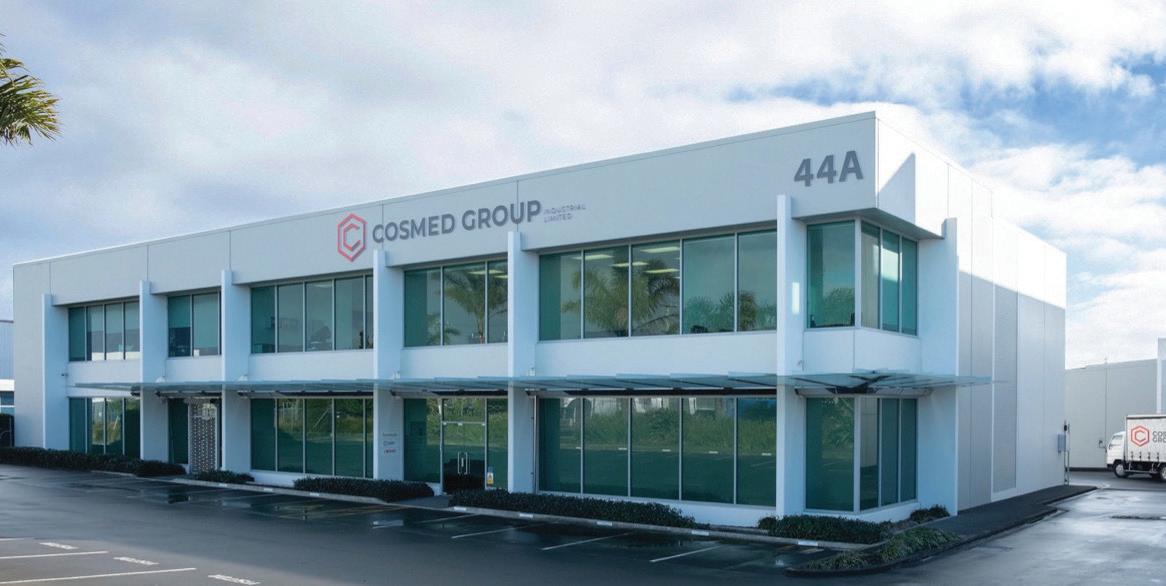
Co-founder, Dr Olga Garkavenko, says the pandemic came into this world unexpectedly and changed the way society operates. “This has caused a lot of businesses to rethink their strategy. Not only are the established successful brands switching to us, but there’s also many new players too,” she says.
Olga Garkavenko, PhD – Co-Founder and Chief Scientist at Cosmed Group.
Dr Garkavenko’s core strength is in Biotechnology R&D, but she says it is a team effort all round. “I’m proud of all of our dedicated and enthusiastic team members. We have more than 100 years of combined experience across all the services. This includes Cosmetic Science Research, Ingredient R&D, Business Management, Quality Management, Environment Management, GMP Production, Cosmetic Care, Personal Care, Health Products, Consumer Products, Supply Chain, Engineering and Customer Services”.
About eight out of ten of Cosmed’s clients are based in New Zealand. Most of these clients want help in developing formulation of their own brand, ensuring quality across each stage of the process. Cosmed Group creates a unique business package for each client, including VI Design, packaging solutions, product IP issues and registration.
A big selling point for Cosmed’s products are that they are made in New Zealand which has a good reputation overseas for its natural and sustainable products. The demand for natural ingredients in cosmetics is on the rise globally, and environmental issues are growing in importance, making sustainability, ethical
sourcing and their related labelling schemes more prominent. Changes in consumer behaviour and lifestyles are also creating openings for natural ingredients.
Cosmed Group is BioGro NZ Organic Certified and a member of Natural Health Products New Zealand, which allows them to formulate, process and manufacture certified organic products to get global market access.
The Cosmed team of qualified in-house chemists offer an industry best-practice product research and development service. They not only create new products but also work collaboratively with clients to solve their product issues and offer improvements to existing products. “Reformulation of products can be a simple way to improve a product’s quality or price point,” says Olga
The R&D team has extensive experience creating quality products for both local and global markets; understanding client needs and their target markets is essential for the creation of unique products.
The complete manufacturing process takes place in their East Tāmaki factory on Crooks Road. Everything happens here, from design, planning, production, packing and execution. They’ve implemented ISO9001 & ISO14001 certification, the world’s leading management system standard. “That’s why every product and every batch we manufacture goes through rigorous quality control processes to ensure our client gets superior quality products,” says Olga.
When you ask Grant Forbes what drives him everyday, he has a simple one-word answer: excitement. Meet Grant face-to-face and that excitement about his business is tangible and infectious.
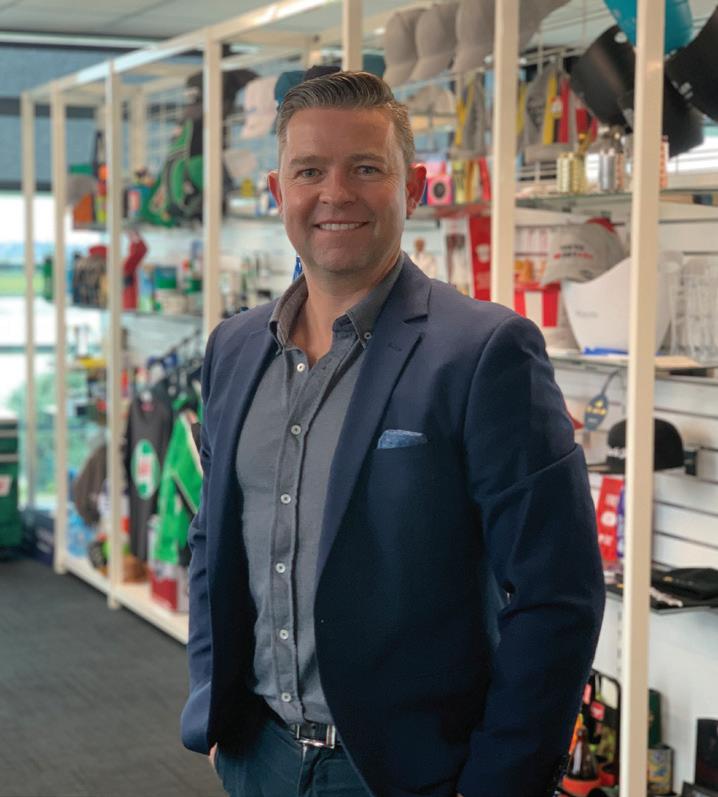
Grant is the Managing Director of independent marketing and promotional business, Zinc, here in NZ. From the word go, he’s always had a passion for marketing and brand promotion, and armed with a Bachelor of Commerce majoring in International Business and Marketing from Auckland University, this is what eventually led him to set up his own business in 2004. This is exactly what Zinc is still specialising in today.
You can’t fail to have noticed the impressive Zinc offices on Highbrook Drive overlooking the Tāmaki River. The office and the large distribution warehouse behind it are part of a much bigger picture though. There’s 350 employees in 20 offices in 13 countries, across Europe, Asia, Australasia and the Americas. It really is a global company in the true sense, with Grant saying each office is a “hub of expertise”.
Grant describes Zinc as a one-stop-shop of specialities: Promotional Marketing, Entertainment Marketing, Licenced Products, Marketing Supply Chain, Wholesale Supply, Contract Manufacturing, PPE, Relationship Marketing and Digital (Web-Shops and Loyalty Programmes). The business deals with everything, from the concept and design of the product, to sourcing the material and getting it produced at scale in an ethical and sustainable way, ensuring its quality control and sustainability, managing the supply chain, setting up the customised ordering platform and even holding and distributing the material from Zinc’s warehouse.
Chances are you will already have come across some of the products that Zinc has created, produced, marketed and distributed. That attractive reusable shopping bag that you use every day, the promotional metal bottle you drink from, the branded apparel piece you love – even the hand sanitiser and mask you wear. Zinc’s diverse group of clients range from banks, to fast food restaurants to large NZ retailers and petrol stations.
Grant says there’s several reasons why the business is successful “It’s down to the culture. We challenge expectations, we make it easy and we’re transparent. We’re a safe pair of hands.” Grant explains that they don’t just execute the brief the client gives them - they ask questions and encourage the client to think outside the box. “Sometimes the client doesn’t want to do anything differently and that’s fine but we’re here to challenge them, to offer other suggestions and make them think of other ways of doing things.”
From the moment someone starts at Zinc, they’re on the ‘Zincie Journey.’ The focus is on three key elements of their experience at Zinc - Connect, Adapt and Grow.
Zinc knows that a good culture is underpinned by a great benefits programme, the idea being that better staff create better ideas, so they can do a better job for their clients that therefore generate better outcomes. There’s thoughtful and flexible benefits that go far beyond free breakfasts, lunches and Friday drinks (although they have those too).
From flexible work options to free gym memberships and generous additional leave days, Zincies enjoy a wide range of benefits.
Feel free to contact Grant for a catch up on +64 9 273 ZINC (+64 9 273 9462) or info@zinc.co.nz
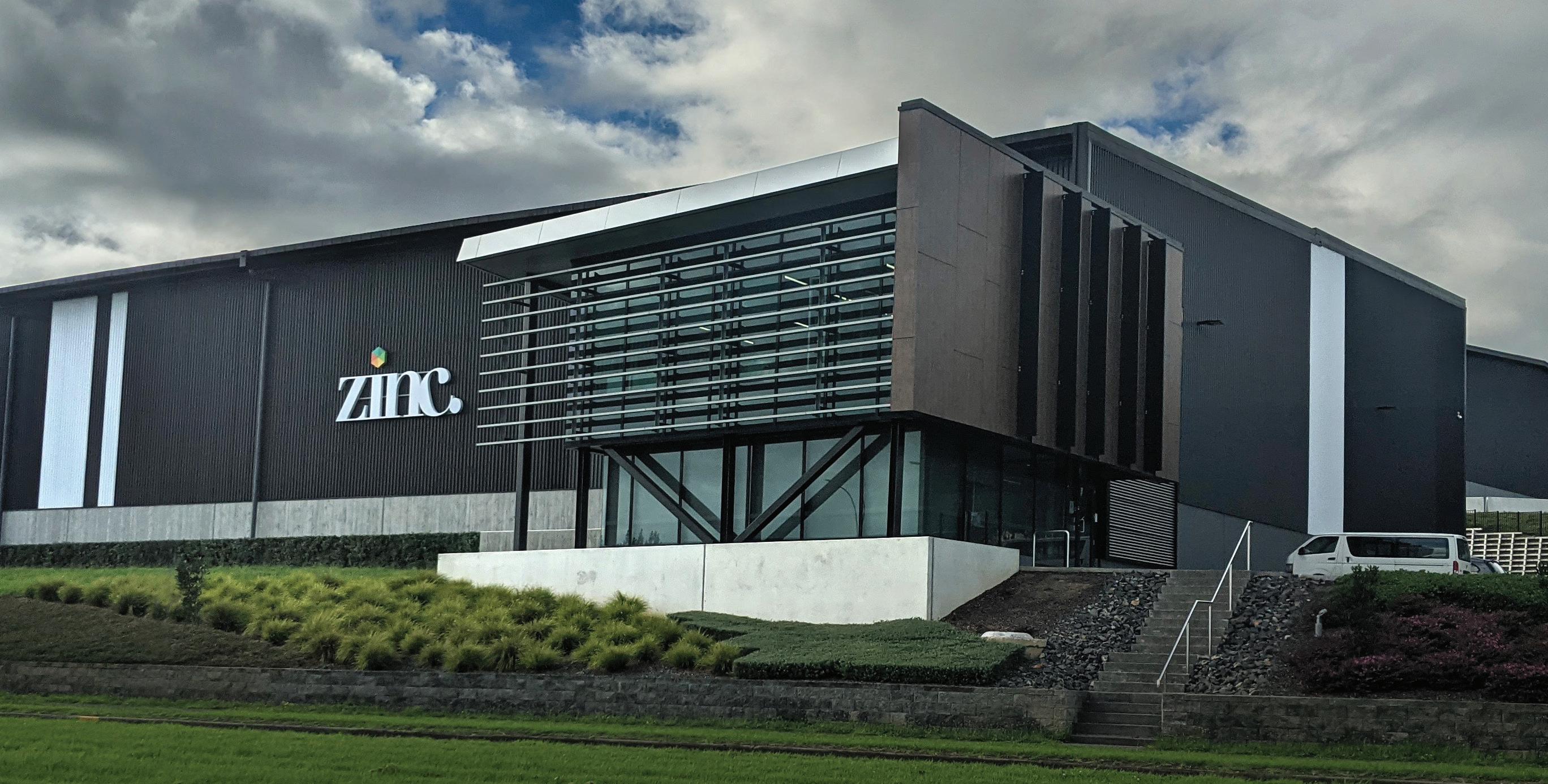
Make one of these office spaces your own. Options range from a hotdesk or a dedicated office, to a large economical space. Locations in Highbrook, Manukau and Penrose.
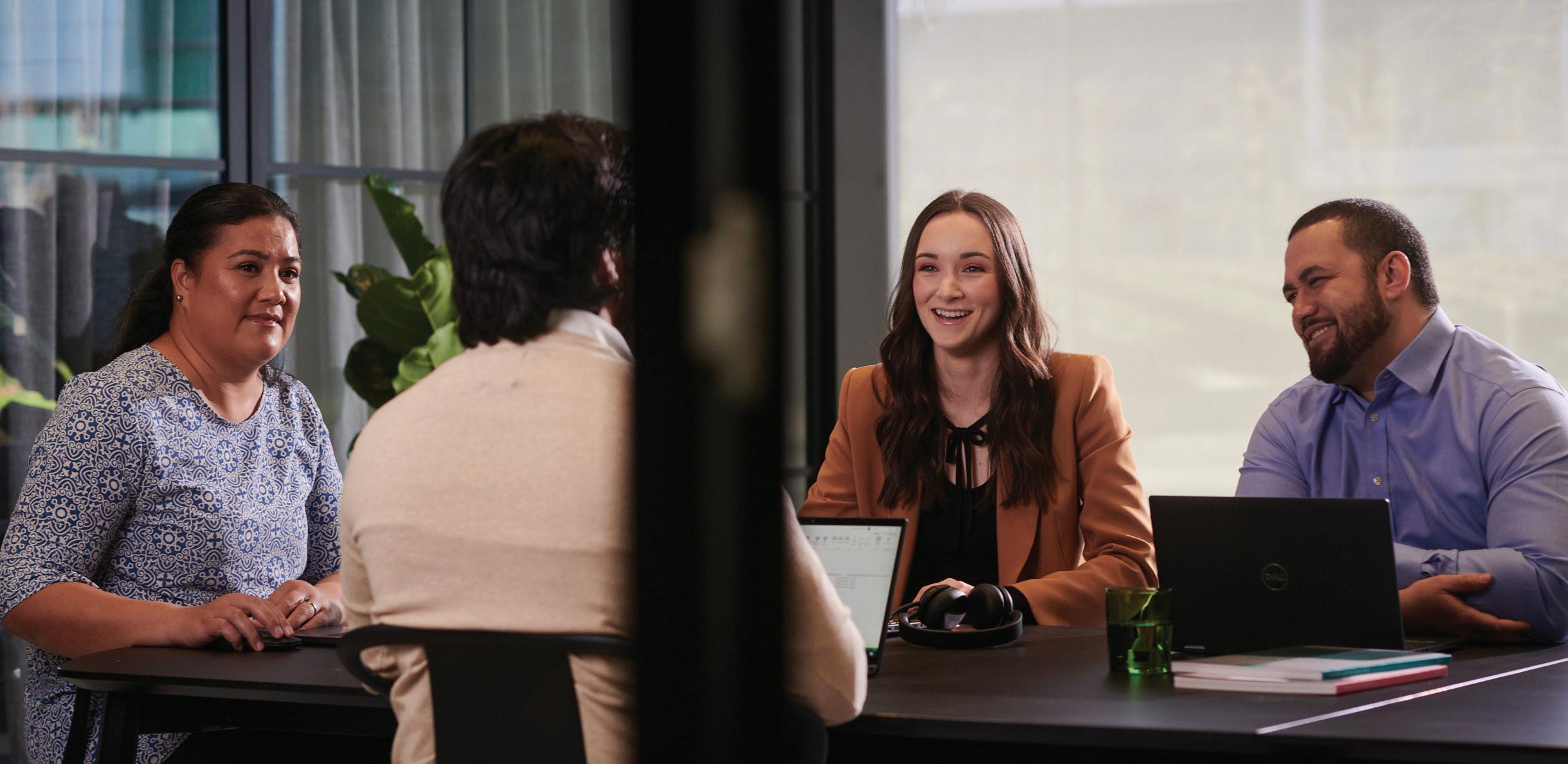
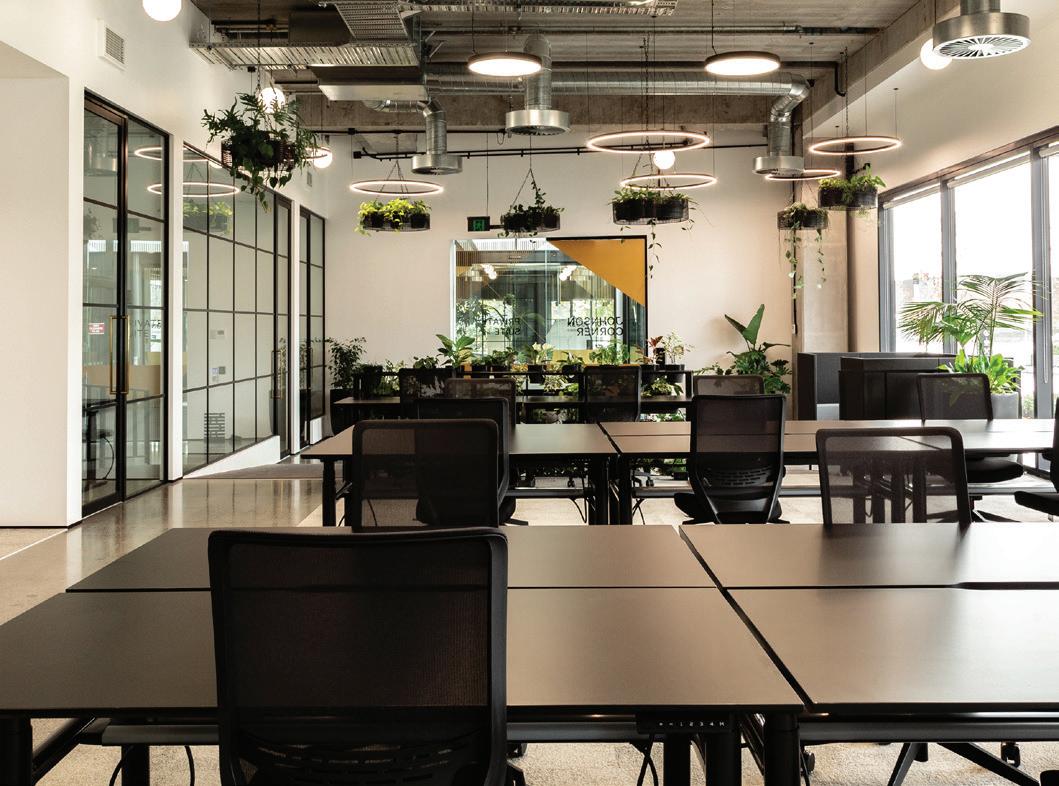
60 Highbrook Drive, Highbrook
Patel 09 265 1133

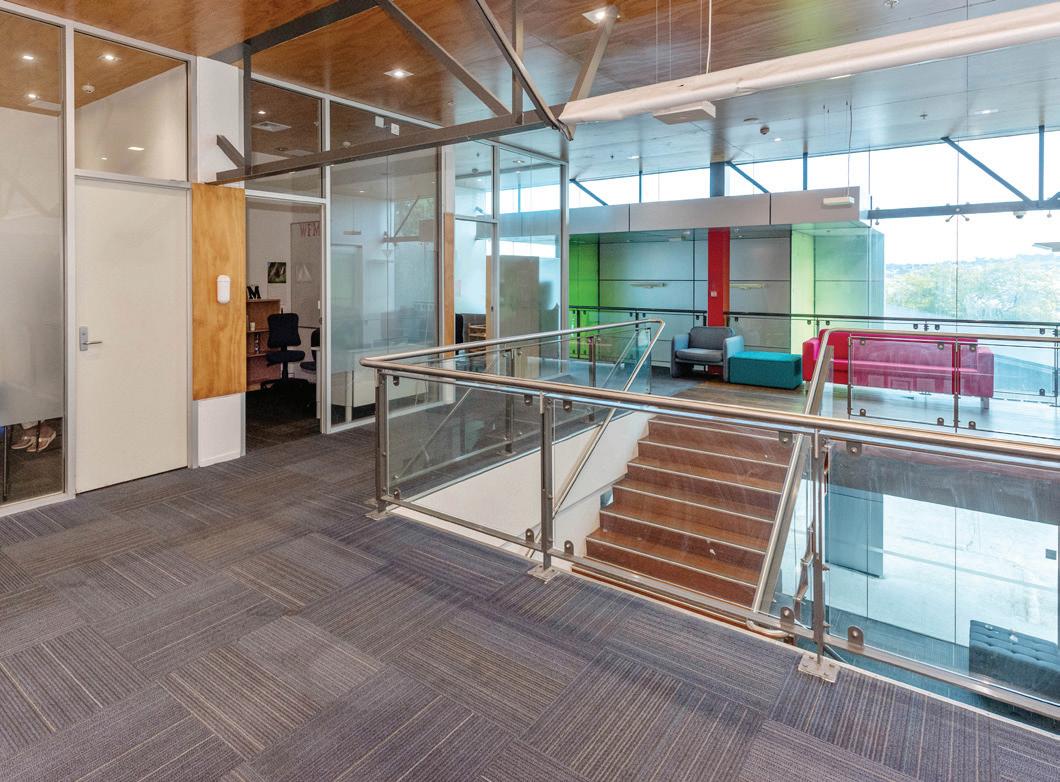

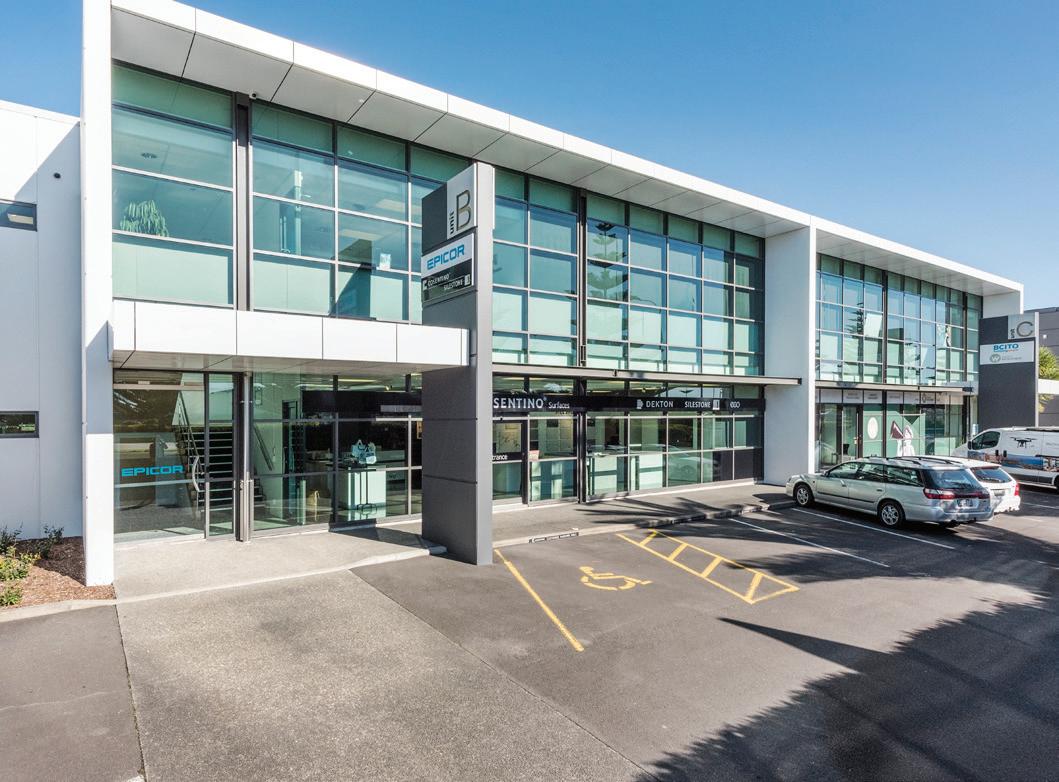




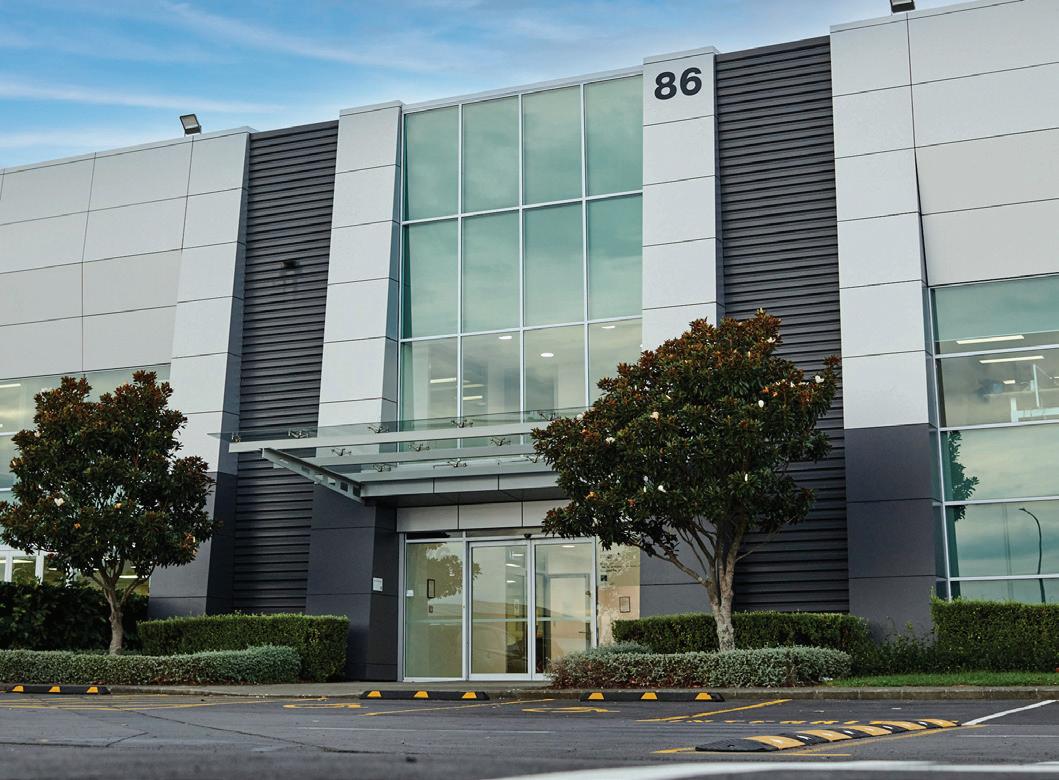




Cast your mind back to a time your world was shaken. When you felt so off balance that you had no idea how you would ever get through. Reflect on this as someone who has learned, grown and developed despite that adversity you faced. Can you see how, despite the pain and stress of this situation, you somehow made it through?
You may have heard of Viktor E. Frankl – an Austrian psychiatrist who tells his story as a survivor of the Holocaust in his book Man’s Search for Meaning. The book explores how Frankl came to do what many might perceive as unthinkable – finding meaning and existential growth from an incredibly traumatic experience. He puts his survival down to the faith that he would one day use his experience to help others get through tough times – which, of course, he did.
As I reflect on the last few years we have collectively faced and how COVID19 has disrupted our lives, I – like everyone – wondered if things would ever be the same again. In March 2020, a national state of emergency was declared in Aotearoa New Zealand, changing our world forever.
Since that day, I have supported clients through a variety of debilitating challenges triggered by this pandemic. Job losses, health anxiety, financial crisis, overwhelming fear and the inability to attend funerals of loved ones.
Two years on, we are still living with the impacts of COVID19. So, I’d like to provide you with some hope. Recent studies suggest that up to 70 per cent of people experience positive psychological growth from difficult times.

Wellbeing support advisor and counsellor, Benestar Group. Lily is a registered counsellor based in Maraetai, experienced in the health and wellbeing field, drawing on clinical training and holistic therapy to create balance in her therapeutic work. Her unique focus is working through physical and emotional health challenges with clients using the mind-body connection. Her approach considers hauora (all dimensions of ones’ life) to be critical to overall wellness and she’s passionate about guiding people towards living more harmoniously. Lily holds a BSocSci, Post Grad Diploma in Counselling Theory, Master of Counselling and a certificate in nutrition.

“When we are no longer able to change a situation, we are challenged to change ourselves.”
― Viktor E. Frankl, Man's Search for Meaning.
The personal transformation and advantages that come from working through a challenging time or crisis.
Post-traumatic growth identifies an opportunity we all possess: to use life’s challenges as a catalyst to develop a greater appreciation for our life, our loved ones and a deeper sense of self, our values and purpose.
Like the mythical tale of the phoenix rising from the ashes, you too can come out of life’s toughest times stronger, wiser and more resilient than before.
• Psychological research has taught us that challenges can lead to actual developmental changes in the brain –forming new pathways between brain cells and altering the way our neural connections are made.
• In other words, fundamentally changing the way we view the world. How these changes manifest depend entirely on the way we choose to experience them.
Allow yourself to feel whatever it is you need to during the tough times you face
• Emotions are part of the human experience and exist for a reason.
• Just as food must pass through our system, so must emotions.
• Problems only arise when we become stuck in those emotions (just like if food became stuck in our body).
• Anger, anxiety, guilt, sadness and grief during tough times are normal and we should never attempt to ignore or suppress them.
• Embracing the art of positive psychology by adopting an optimistic mindset promotes growth.
• Growing from an experience doesn’t mean denying the feelings that come with it.
Create space for your feelings with as much self-compassion as possible. Affirmation: “Given my current situation, it’s understandable I am feeling ____.”
Engaging in active positive thinking trains our brain to becoming more resilient and adaptive. Affirmation: “I am strong and resilient.”
Stress during tough times can lead to dysregulation of the nervous system – the bodies command centre. Conscious deep breathing is the single most effective way to regulate it, sending signals to the brain that no emergency is happening. Try the triangle breathing exercise – inhaling for four counts, holding for four counts, exhaling for four counts and repeat as needed. Affirmation: “My mind and body are capable of getting through this.”
Research continues to show us the power visualisation holds. Dedicate time to imagine the details of what the other side of this challenge will look and feel like. Affirmation: “I can see and feel myself overcoming this.”
Take a step back and consider how you have made it through times before and the strength you have shown. Affirmations: “I’ve made it through tough times before, and will do it again,” or “This too shall pass.”
Therapy can help guide you through the process of post-traumatic growth. However, it is not always necessary or the right option for everyone.
Scientists have discovered that trees not only need the elements of light, water, and earth to survive. They also need wind. Without the wind testing them and physically bending them, trees are unable to grow to their fullest potential. In fact, they have been known to become weak and even fall without wind exposure.


• If we watch a tree as it faces the wind, we see it does not resist. Instead, it accepts and lets go, moving with the wind and not against it, remaining safe and grounded in its roots.
• In working with clients, I see how so many of us long for the perfect life. We can all find ourselves wishing tough situations or challenges away. It’s in our human nature to want to avoid difficult times and yearn for the ‘good’ ones.
• But like the tree, we too must learn to flow with the trials and tribulations of life. To understand that these tough imes we face are not only making us stronger – they are creating us.
If you or someone you love is overwhelmed by a current challenge and feel helpless, it’s important to talk with someone you trust, or a mental health professional.
Lifeline 24/7 Helpline: 0800 543 354 or Free Text: HELP (4357)
Visit your family doctor or your place of employment may offer funded counselling support through an Employee Assistance Programme (EAP).
Living in a time of constant change and disruption, it’s important you and your business are prepared
The only constant is change. This has never been more so as we learn to live with COVID-19, and the associated staffing and supply chain challenges.
To ensure you and your business are resilient to emergency and disruptive events, you need to plan and be adaptive.
Auckland Emergency Management has some great resources to help you plan.
Research and experience from previous emergencies shows that businesses that had the skills, plans and relationships in place, fared a lot better than those that didn’t. By preparing, you reduce the impact and cost of an emergency, and reduce incidences, such as a ransomware attack. Good planning means being able to recover and adapt faster after an emergency.
Preparing well helps to reduce the impact and cost of an emergency. As COVID-19 clearly illustrated, those businesses that had a good online presence and the infrastructure in place for their staff to work from home, were not as badly impacted as those that didn’t.
Planning enables you to respond in a way which meets your legal requirements, reduces reputational damage, keeps your staff safe and keeps your customers and suppliers happy.
Finally, and most importantly, it means being able to recover and adapt faster after an emergency – all of which saves you money.
Did you know – it’s a legal obligation under New Zealand’s Health and Safety at Work Act 2015 to keep your staff safe
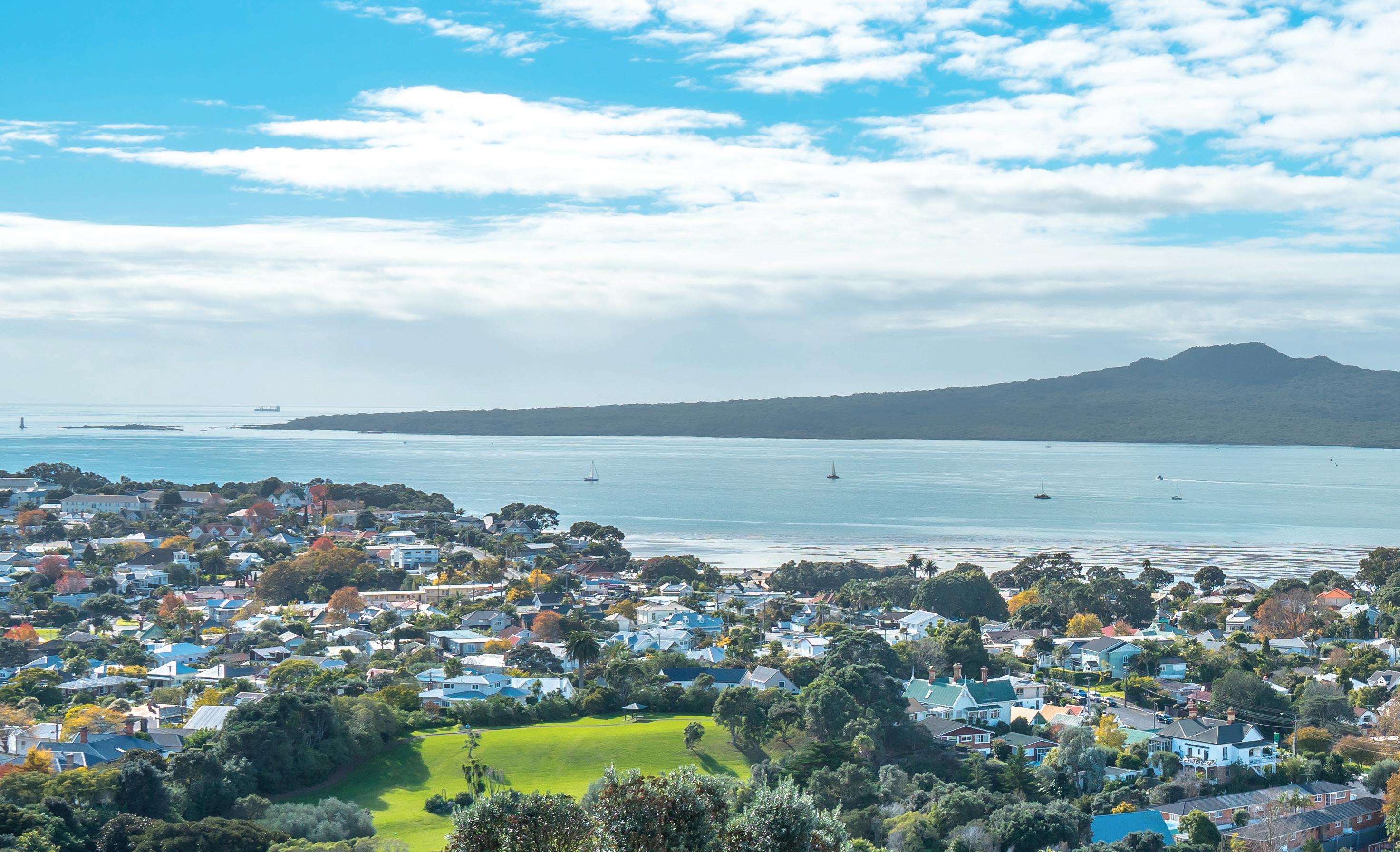
during and after an emergency.
All businesses must have an Emergency Response Plan (ERP) appropriate to their type of business and number of staff. An employer who does not prepare, maintain, and implement an emergency plan commits an offence and can be convicted.
An ERP details what you, as the business owner, and your staff will do when an emergency happens.
The ERP covers the basics such as evacuation procedures and having emergency supplies – first aid kit, food, and water.
It’s really important that as a business owner you include your staff in your emergency planning. Everyone needs to know where to evacuate to, where the emergency supplies are kept and who to contact in an emergency.
Auckland Emergency Management has developed an Emergency Response Planning Template to help small business owners meet their legal obligations and keep their staff safe in an emergencyaucklandemergencymanagement.org.nz/work-ready
Disruptive and emergency events, especially large events, are often catalysts for change and opportunity. If you handle the emergency well, your business will not only recover, it will thrive.
Business continuity planning enables you to fully function to the greatest possible extent during and after an emergency. Understand the core parts of your business and what skills, equipment and supplies are needed - ensure you have the necessary alternatives in place.
Think of it as a game of ‘what if’? What if you have an accident or are unwell, who else has authority to pay bills or wages, or update your website? What if there is a fire and you can’t access your premises for weeks? Where else can you operate your business from? Are all your important documents and records backed up?
A business continuity plan is usually a written document, but it’s the thinking and steps you go through that are important – not the document itself. The document simply gives you a means to capture the information so that you can share it and later update it. Business continuity plans need to be tailored specifically to the business; there is no one size-fits-all solution.
To make it easy for small business owners to develop a business continuity plan that meets the needs of their business, Auckland Emergency Management has a Business Continuity Plan Guide and template.
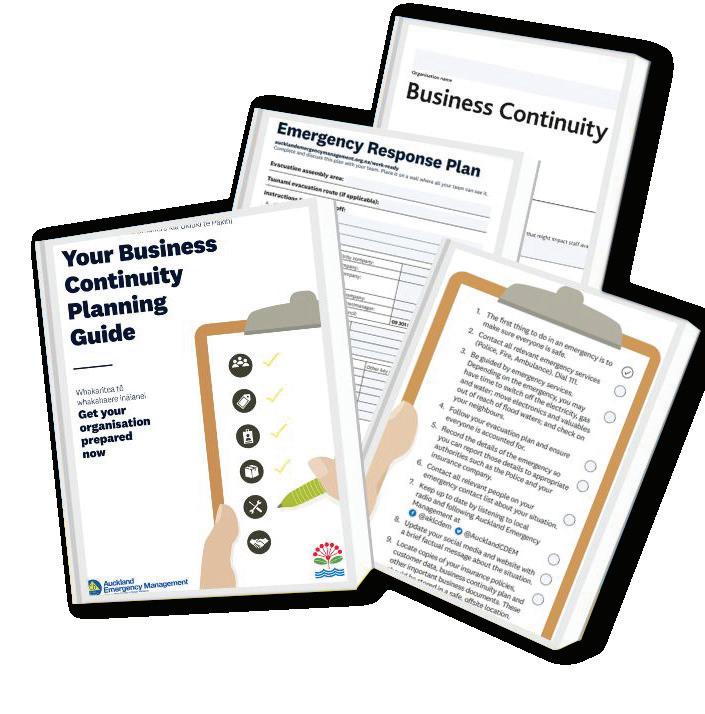

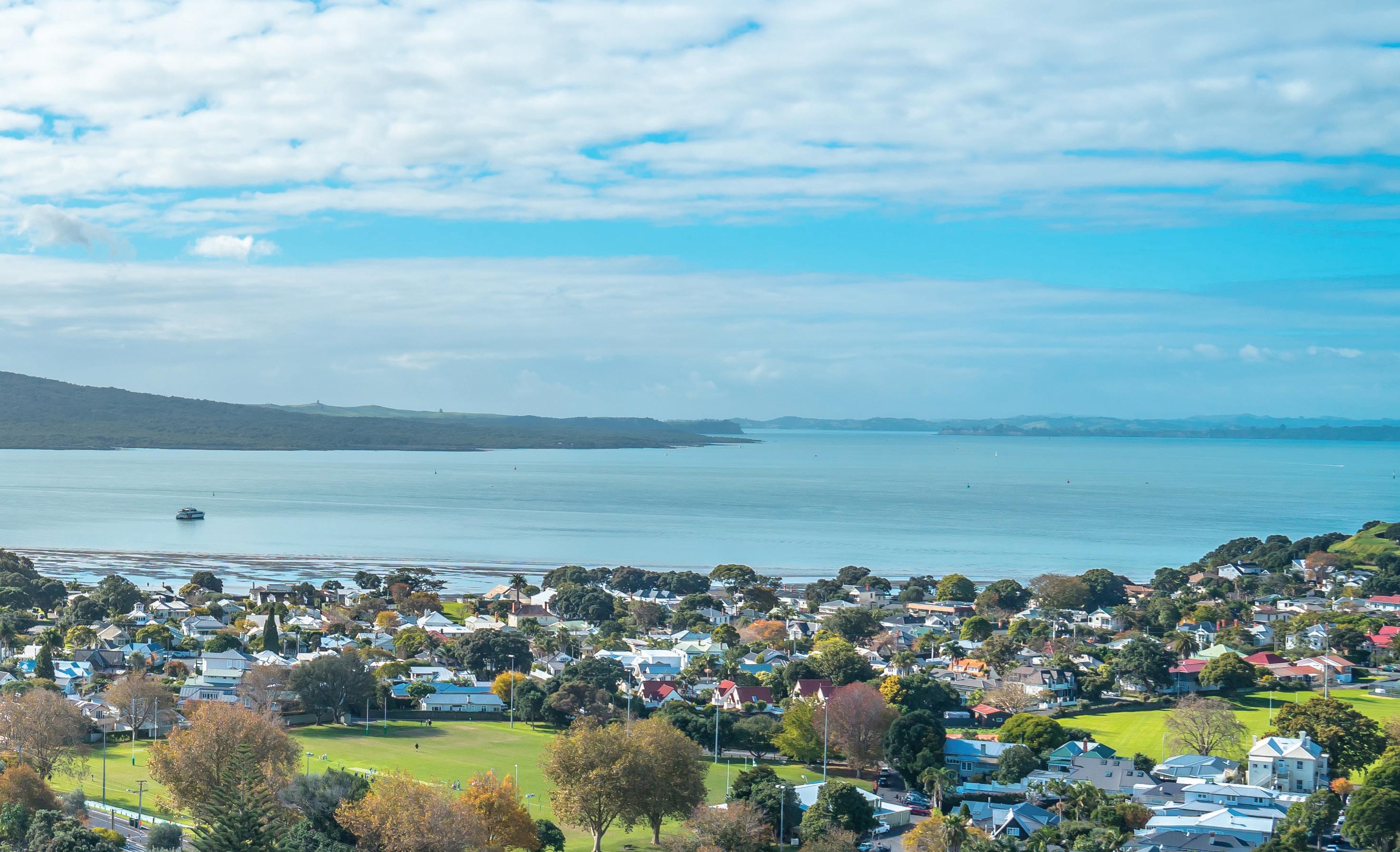
Resilience isn’t just about emergency planning; you also need to be adaptive - no two crises are the same. Regularly look at doing things differently or better, and you will be more skilled at innovation. Your relationships are key. Communicate early and often and involve your team.
When: Tuesday, 18th October, 8am-10am
Where: Fisher House, 117 Kerwyn Avenue, East Tāmaki.
Register: Email comms@businesset.org.nz.
Places will be limited to 30 people.
You will need to attend in person, as the workshop is highly interactive.

The latest data from NZ Police Counties Manukau East again highlights that offenders are committing opportunist crimes. Burglary, car conversion (stolen cars), and theft from vehicles increased across the area. Police are therefore urging employers, employees, property owners, and visitors to East Tāmaki and Highbrook to be mindful.


Remember the basics. Always lock your parked vehicle and if you must leave items in there, make sure these are stored securely out of sight. Pulling a coat over your laptop doesn't count as "secure"! If it's visible, it's tempting.
Tradies are definitely being targeted. Unfortunately, it can be too easy for a would-be offender to don a hi-vis jacket and wander discreetly around a construction site acquiring tools from unlocked vehicles.
Installing tinted windows and using secure lockboxes inside the vehicle are useful deterrents. Police also urge tradies to mark their equipment, either by engraving or etching, which should be done professionally so as not to invalidate warranties, or by using a UV marker pen (that can only be read under a UV light) to write their name and phone number.
Stolen items will likely appear for sale online. Buying cheap second-hand tools not only feeds the "supply and demand" of theft but purchasing stolen goods is itself an offence. Deals that look too good to be true almost certainly are. Before you buy, always ask yourself, why would someone legitimately be selling (for example) $800 worth of tools for only $100?
Toyota Aqua and Mark X, Mazda Demio, and Nissan Tiida are the vehicles most likely to be stolen. They are also the makes and models most often used in ram raids.
These cars are key-operated and do not have in-built immobilisers. Therefore, spending $40-$60 on a steering wheel lock could be a prudent investment, particularly when compared to the cost, inconvenience, and stress of being without a vehicle
potentially for several weeks whilst insurance claims are settled.
Although burglary slightly increased across Counties Manukau East in July, the East Tāmaki business precinct rate is comparatively low. Police credit Business East Tāmaki's crime prevention initiatives, including ANPR cameras, for helping to achieve this.
As part of an ongoing engagement programme, NZ Police's Ormiston Youth Aid team, with the Tyla Youth Trust and Ōtara Youth Hub, hosted the inaugural Ōtara Chess Tournament. Chess clubs from Papatoetoe, Manurewa, and Ōtāhuhu all attended. There was a great atmosphere, and the event was well-received by everyone.



In June the bear market became official — defined by a –20% decline in stock prices. Fortunately, investors had a reprieve in July with a strong rally, with stocks boosted by generally better-than-expected earnings results, plus (in the ‘bad news is good news’ vein) gloomy economic data which suggests that central banks may have to slow the pace of interest rate hikes.


There remain many uncertainties around the global economy; however, we can reassure you that bear markets do end. They are a (thankfully only a semi-) regular occurrence and such turbulence is the price investors pay for earning higher returns over the long term versus putting their money in more stable investments like the bank.
The bad news is they are not abnormal. For investors who’ve only been in the market over the last decade or so that might not seem the case. Outside of the COVID crash in 2020, investors have had an unusually smooth run. But looking back through history, a bear market — typically defined by a –20% decline in stock prices — happens on average once every five or six years.
Since 1950 there have been 11 bear markets. All are different — in cause, depth, length, and recovery.
The past three have been among the more dramatic. The COVID crash was the fastest bear market in history. The Global Financial
Crisis was the deepest downturn since the Great Depression. And the Dot.com crash was one of the longest and largest downturns on record.
The good news is, firstly, markets are almost guaranteed to recover. On average, since 1950, it has taken two years and three months for a market to reclaim the losses incurred during a bear market. The longest recovery period was just over four years following the Global Financial Crisis.

Also good news is that share markets typically perform very strongly on the other side of a bear market. The average return in the year following these bear markets has been 45%. The lowest return in a recovery year has still been a very healthy 23%. For the two years following a bear market the average return has been 63%, with the lowest being 42%. A further piece of good news is that bull markets considerably outweigh bear markets, both in time and returns.
The best advice is not to panic and to stick to your investment plan. That is what it is there for, to keep emotions at bay and help navigate choppy periods in markets in order to successfully meet long-term goals.
It’s important to remember investors benefit from owning good businesses which grow their underlying value over the long term. Today’s good businesses have not only endured previous bear markets but have flourished on the other side.
If at any stage you’d like to discuss the current challenging investing environment, investment options and opportunities, or review your investment plan, please contact your local Forsyth Barr Investment Adviser, Pam Cussen, David Morgan, or Mark Steele, on (09) 368 0170 or 0800 367 227, or visit their office at Wynyard Wood House, 60 Highbrook Drive, East Tamaki.
This column is general in nature and does not take any of your personal circumstances into account. For personalised financial advice, contact Forsyth Barr for an overview of the services we can provide.
This article was prepared as at 31 July 2022 and provides market commentary for the three-month period ending on that date.


The biggest issue impacting EMA members is workplace skills shortages and the associated immigration reset.
An EMA Skills Shortage survey returned over 330 responses from businesses across 50 sectors. The common theme is - anyone looking for people is struggling to find them, with 40 per cent of respondents having advertised roles for over six months without success. Some had the same roles advertised for over a year. To see the survey results in full, go to emalive.co.nz/ documents/advocacy/Skills-Shortage-Vacancies-and-Immigration
We are regularly in contact with Immigration NZ, and while their processing capacity has improved, they are processing around 11,000 Work to Residence Visas monthly compared with the previous 2,000 per month. This creates system backlogs and pressure.
The Accredited Employer Work Visa (AEWV) has not delivered the results employers expected. A significant disconnect exists in the ‘Job Check’ stage - Immigration NZ’s expectations around information required vs information received from employers differ considerably. This causes significant numbers to be reverted or rejected.
For employers, the scheme is compulsory if they want access to the migrant pool. The new scheme is not dissimilar to the previous system, with the only new part being the reduction from six visa classes to one, the compulsion to join the scheme and median wage barrier to entry.
Looking ahead, many EMA members are working within the constraints by upskilling their workforce. This is evident in the work that EMA and Business East Tāmaki member, Nautech Electronics, are doing. Nautech staff participate in process, products, services, and work environment improvements, which leads to greater productivity, and a positive employee experience.
Join Nautech Electronics for the free Smart Factory Showcase.
Register now – www.industry4.govt.nz/UpcomingEvents
Skills shortages are affecting all sectors and are often felt in occupations that pay below median wage. The EMA agrees that a highly skilled, highly paid workforce is needed, but we feel that training up those people and making the productivity gains that lead to a higher waged economy takes time. There is currently no programme to accommodate this.
We’re suggesting that a managed transition period for necessary and skilled, but lower paid, migrant workers be established to permit entry. This needs to occur while we address the skills gaps in our local workforce. Applying a median wage requirement to the scheme simply creates an immediate entry barrier.
We need an immigration policy that addresses gaps in a shorter-term, transitional way as well as managing the acute shortages in highly skilled roles. Businesses already work hard to upskill and manage their shortages internally, but we need our education and welfare sectors to focus on producing work ready and work willing people from available talent pools.
Work is also needed to make New Zealand an attractive option for migrants to work. Many people are rejecting the chance to enter, citing high living and housing costs, and border uncertainty.
100%
100%
100% of respondents with vacancies said they were
100% of respondents with vacancies said they were
38% of respondents had been advertising vacancies for over six months
38% 53% applicants work
38% of respondents had been advertising vacancies for over six months
38% 53% applicants work
The skill often do levels
The skill often do levels
Between 17-22%
espondents had acancies months
53% espondents had would er Work settings
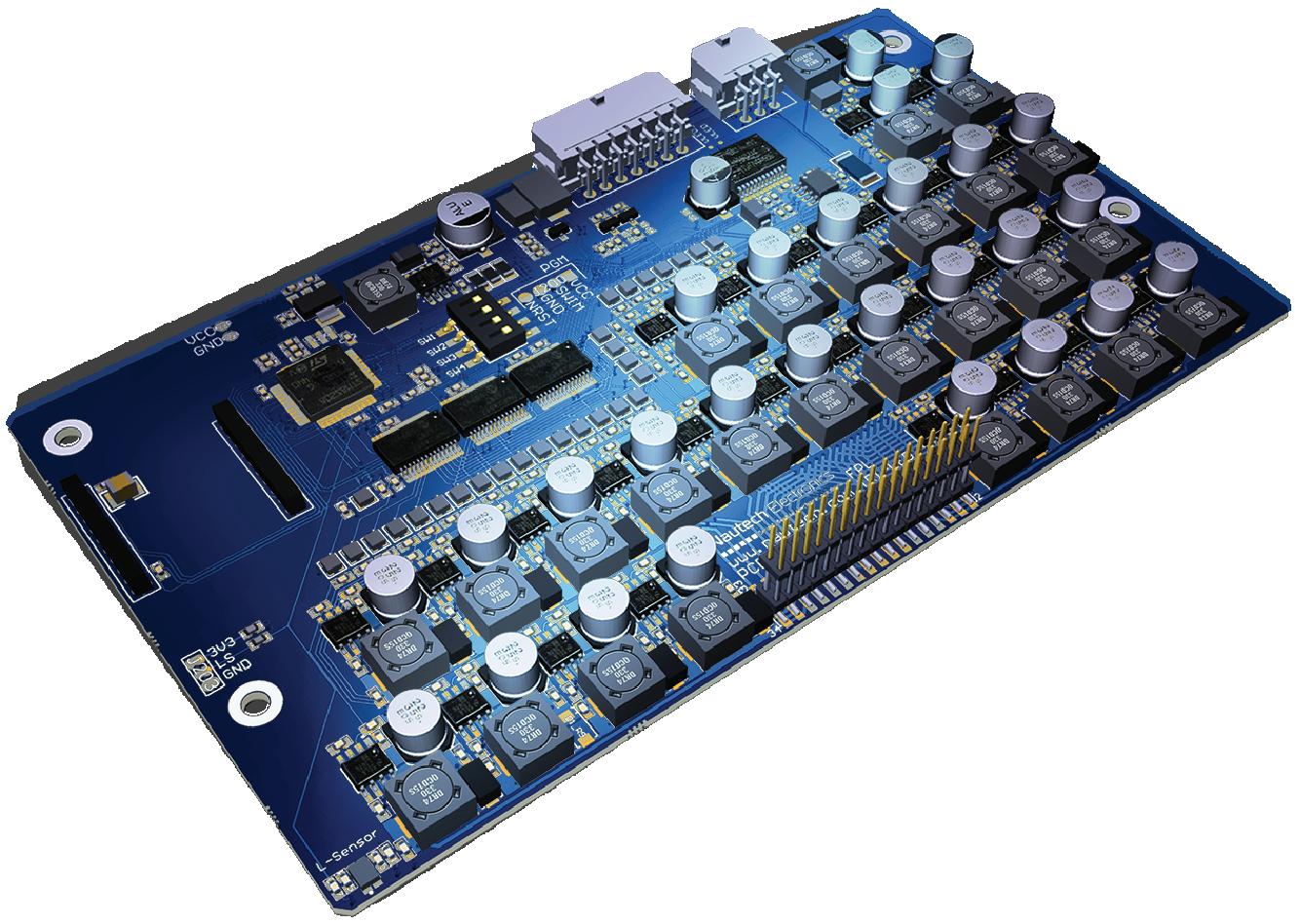
53% of respondents said applicants were lacking in work readiness skills
Between 17-22%
Between 17% and 22% of respondents said applicants were lacking in literacy, numeracy, and IT skills
Between 17% and 22% of respondents said applicants were lacking in literacy, numeracy, and IT skills
The skill levels of the vacancies often do not match the skill levels of the applicants.
35%
35%
35% of respondents had vacancies that would
35% of respondents had vacancies that would
Accredited Employer Work Visa (AEWV) settings
Accredited Employer Work Visa (AEWV) settings
On the 1st of October a range of singleuse plastic items will become illegal to manufacture, sell or give away for free with a sale. A lot of businesses are unaware and unprepared for these changes. Is yours one of them?
While plastics are a valuable resource, enabling much of our technology and quality of life, they’re also one of our greatest environmental challenges due to end-of-life mismanagement.
The new regulations act to remove some difficult-to-recycle and frequently littered items. This will reduce the impacts on our moana and whenua and help make our recycling systems more efficient

Some of it’s not straight-forward, so let’s look at each item in detail.
Rigid PVC food trays and containers


Includes: Pre-formed trays and containers used for meat (including substitutes), produce or baked goods. Typically, a business will have a stock of these items on hand for packaging of goods.

PVdC is also covered by the ban. This means pre-formed multi-material trays with a PVdC layer are also included.

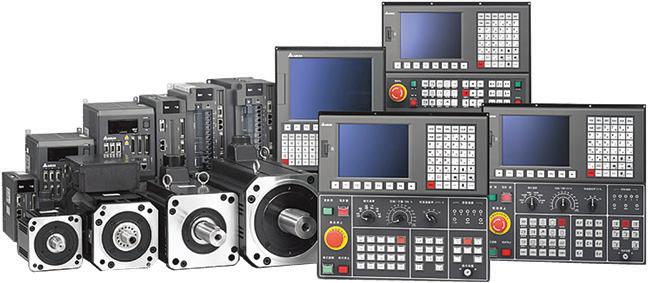

Excludes: Form-fill-seal trays, where the packaging is formed, filled with food and sealed on the same line (think butter and sauce sachets, branded sliced meats). PVC will be banned for these applications in mid-2025.

Includes: Rigid polystyrene (PS) and expanded polystyrene (EPS or XPS) packaging used for food & beverages for immediate consumption. For example, sushi trays, foamed clamshells, take-away cups, single-use catering serve-ware.

Includes: EPS/XPS used to package retail products such as those sold in supermarkets. For example, instant noodles, meat trays, foamed cup multi-packs.
Excludes: Rigid PS used to package retail products (such as yoghurt sixpacks, sour cream pottles). PS form-fill-seal packaging used in takeaway situations such as a fast-food restaurant. These are included in the mid-2025 bans.
Rigid PS drink lids. These will be handled alongside single-use beverage cups.
EPS bins used for cold-chain, wholesale transport (such as for seafood or kiwifruit).
No idea what these are? You’re not alone! These are traditional plastics, like polyethene, to which an additive has been added to speed up degradation. When exposed to the right conditions they break into smaller and smaller pieces. They are not considered recyclable in New Zealand and are a microplastic risk if composted or leaked into the environment.
Includes: Oxo- and photo-degradable plastics, and all other traditional plastics with a prodegradant additive.
May include: Landfill and anaerobically ‘biode-gradable’ plastics. The Ministry for the Environment will provide further guidance on these soon.
Excludes: Genuinely compostable plastics (recognised certification pre-ferred)

Plastic drink stirrers Includes: Sticks intended for stirring drinks made from,






or containing, any type of plastic including degradable, biodegradable, and compostable plastics. There are no exclusions from this ban.

Includes: Plastic stemmed cotton buds made of all plastic types including degradable, biodegradable, and compostable plastics
Excludes: Cotton buds/swabs used as a medical device, for diagnosis or sampling in vet clinics, food labs, scientific labs, or other scientific or medi-cal sampling outside a lab

The bans this year will be followed by additional regulations in 2023 and 2025. Plastic produce bags, plates, bowls, cutlery, straws and noncompostable produce labels are in scope for 2023. All remaining PVC and PS food and beverage packaging are in scope for 2025.
It can be daunting dealing with changes to your products and packaging. If you need help working through your investigation into the best options to replace banned items, please get in touch.
Plastics New Zealand’s circular economy initiatives Re:Plastics and CircularConnect can help. These are supported by the Waste Minimisation Fund administered by the Ministry for the Environment, and help businesses improve the circularity of their plastic packaging and products. We won’t push you towards plastic-only options. The best solution is the one that works for your business and the environment.
If you’d like to upskill and define your own pathway, Re:Plastics provides a free design guide and subsidised workshops. CircularConnect provides co-funding to allow businesses to work with external consultants on qualifying projects. We look forward to hearing from you!
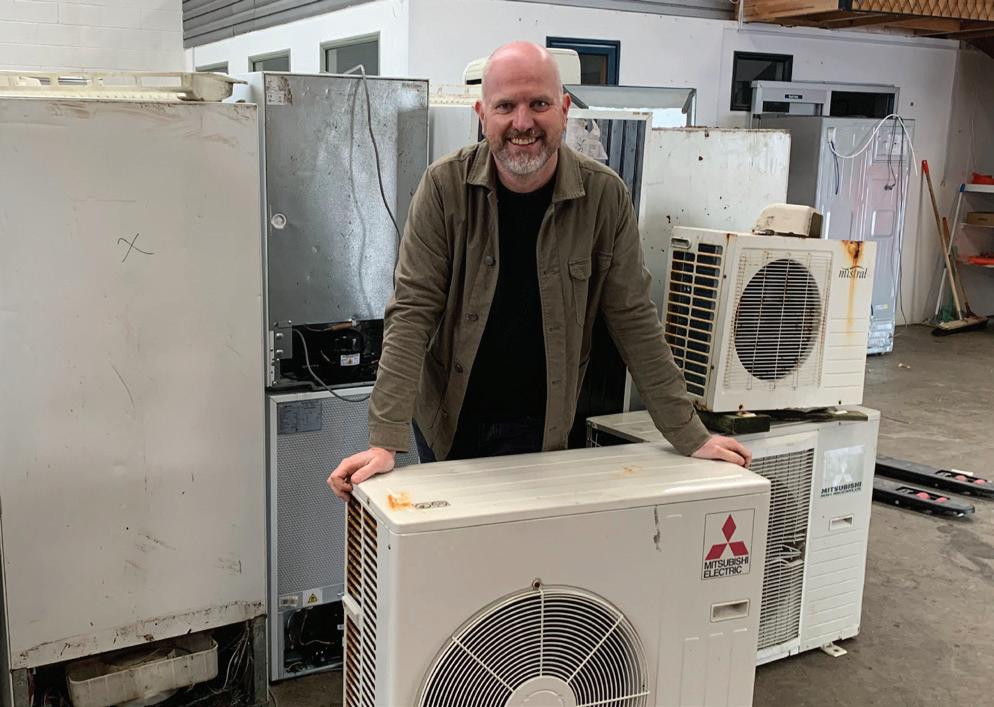
appliances

Business East Tāmaki partnered with Reharvest Timber to complete another successful pallet and waste wood collection. Thirty six of our businesses responsibly contributed 20 tonne of product which was subsequently repurposed as Cushionfall® - a bespoke and award-winning product used in childrens’ playgrounds and garden mulch.
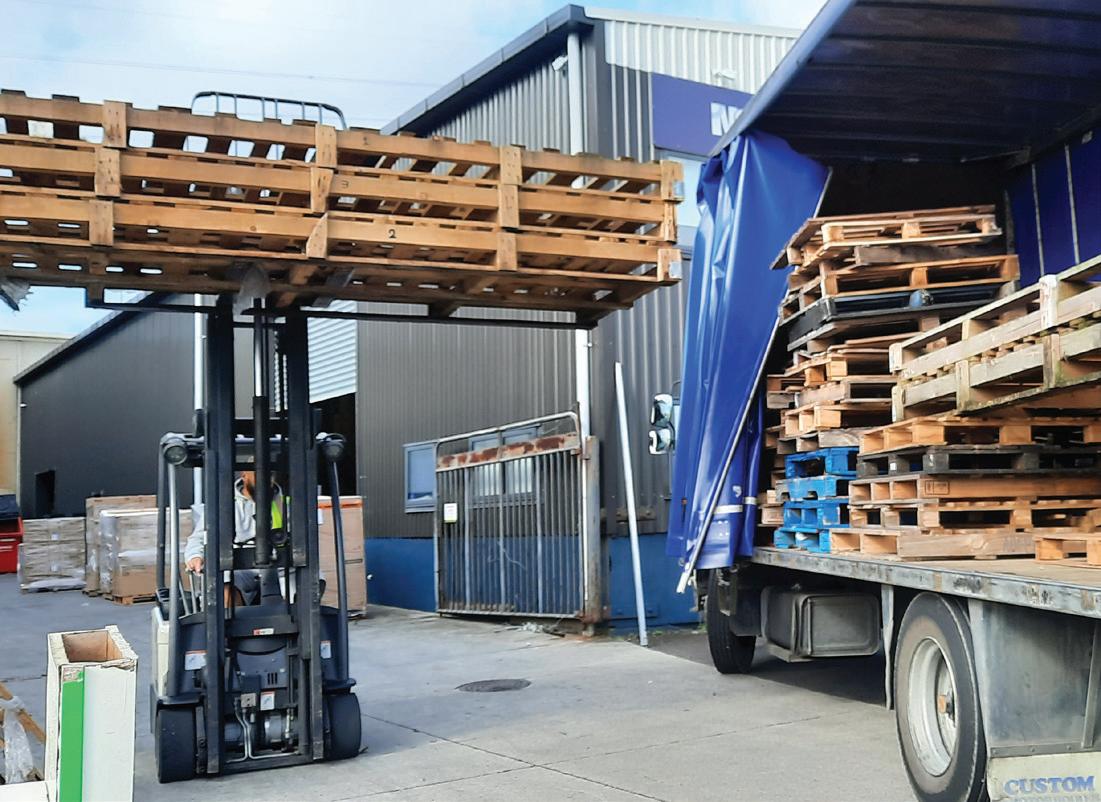
Director Matthew Luxon
have already been degassed.
If you’ve taken your old fridge, freezer or other appliance which uses refrigeration to a local recycling centre, you may think the job is done. However, the leftover gases in them still pose a significant risk to the environment and need to be properly dealt with.
That’s why the Trust for the Destruction of Synthetic Refrigerants recently launched a pilot scheme, in partnership with social enterprise, Localised, which will see the refrigerant gases in appliances like fridges, freezers and heat pumps collected and properly disposed of.
The Trust’s Chief Executive Janine Brinsdon says the pilot will focus on appliances collected through Auckland Council’s inorganic collection as well as those taken to nine community recycling centres around Auckland managed by Localised and the Zero Waste Network. The pilot is expected to degas over 3,000 appliances over a year.”
Results from this trial will help the Trust develop effective ways to roll out the service in more regions.
It’s moth plant season! If you’re out working in the garden, or walking around your neighbourhood, keep an eye out for the Moth Plant. Also known as the Cruel Plant, or Kapok Vine, this pretty vine with green pods climbs rampantly up fences, hedges, and trees. Few people realise that the invasive pest from South America is not only dominating and strangling our native plants and trees, but its sticky sap can trap and kill butterflies and other insects.

Forming a densely tangled vine, the dark greyish-green leaves are arranged in
opposite pairs on wiry stems of the same colour. When broken they freely exude a white, stinging, poisonous sap. Clusters of smallish white flowers through summer are followed by large, pear-shaped green pods each releasing up to 400 black seeds, dispersed far and wide by the wind on their silky white parachutes. Seeds germinate readily and may continue to do so for more than five years.
To get rid of moth plant wear gloves and protective clothing. Finding the roots can be a challenge, but uprooting when flowers show up in early summer before pods form is the best treatment. Otherwise, herbicide can be applied to fresh cut stumps between October and May. Pods are difficult to deal with. They must be collected somehow and securely disposed of by deep burial.
Cabinet art brings colour to the Business East Tāmaki business precinct
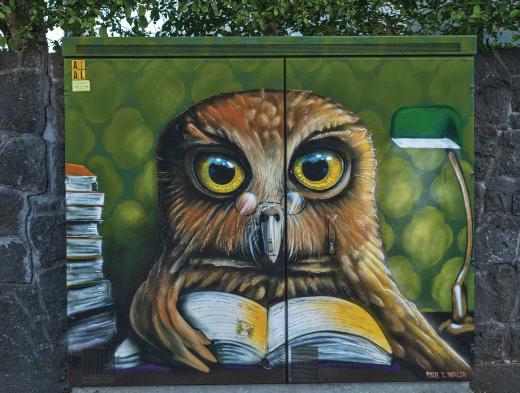
Chorus have chosen a local Chorus cabinet to be part of their nationwide funded programme to enhance the appearance of these units and make them less likely to be targeted by graffiti. Keep your eye out for the cabinet on the corner of Springs Road and Kerwyn Avenue which will soon be showing off its new livery.
There are thousands of number plates stolen each year from vehicles parked in private and public parking areas throughout Auckland. The stolen licence plates are then being used by people committing other types of crime; most commonly in petrol drive-offs, but also used for other crimes to avoid detection by Police, such as car theft, burglaries and robberies.
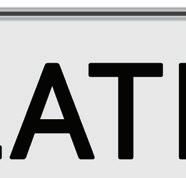
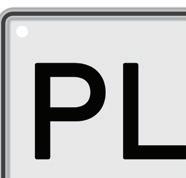
Protect your number plates from theft and have security screws installed for free. Keep an eye out for our email with further details of this popular service which will be held in the carpark at The Crossing, Highbrook, before the end of the year.


This got us thinking about enhancing more cabinets in the Business East Tāmaki precinct but we need your help. Chorus are prepared to fund the artist materials for three more cabinets and Arts out East – which supports creative artists in East Auckland – will fund 50% of the artist commissions.


That’s where you come in! We are looking for a total of $1750 from local businesses to get this over the line. Do you have a Chorus cabinet near your business that is frequently tagged or would you just like to help with
Spring. The days are getting longer and we’re dreaming of lazy days in the sun reading our favourite book! Here’s a few eclectic reads chosen by Tony Moore from Poppies Howick which will give you food for thought – and help you get into practice for those summer-on-the-beach reading days!

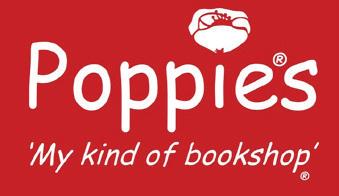
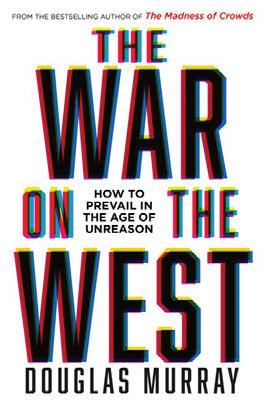
In The War on the West, international bestselling author Douglas Murray asks: if the history of humankind is one of slavery, conquest, prejudice, genocide and exploitation, why are only Western nations taking the blame for it?
By Douglas Murray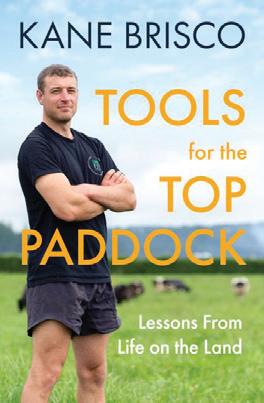
Kane shares the experiences that made him almost quit farming, along with the simple methods he developed for dealing with the mental and physical strains of life on the land. He offers advice to thrive in good times and bad.
By Kane BriscoOwen draws on his own Māori ancestry to weave together insights and collective wisdom to maximise a team's performance. He shines a light on where these powerful ideas are applied around the world in high-performing settings encompassing sport, business, the arts and military.
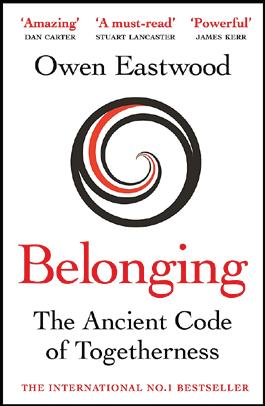

 By Owen Eastwood
By Owen Eastwood
A war between China and the US would be catastrophic, deadly and destructive. Unfortunately, it is no longer unthinkable. Rudd offers real insight into the mindsets of the leadership whose judgement will determine if a war will be fought.
 By Kevin Rudd
By Kevin Rudd
Hundertwasser in New Zealand is a richly illustrated and accessible account of the artist's love of Aotearoa, his interaction with the people and land, and the influence these had on his work.
 By Andreas J. Hirsch
By Andreas J. Hirsch
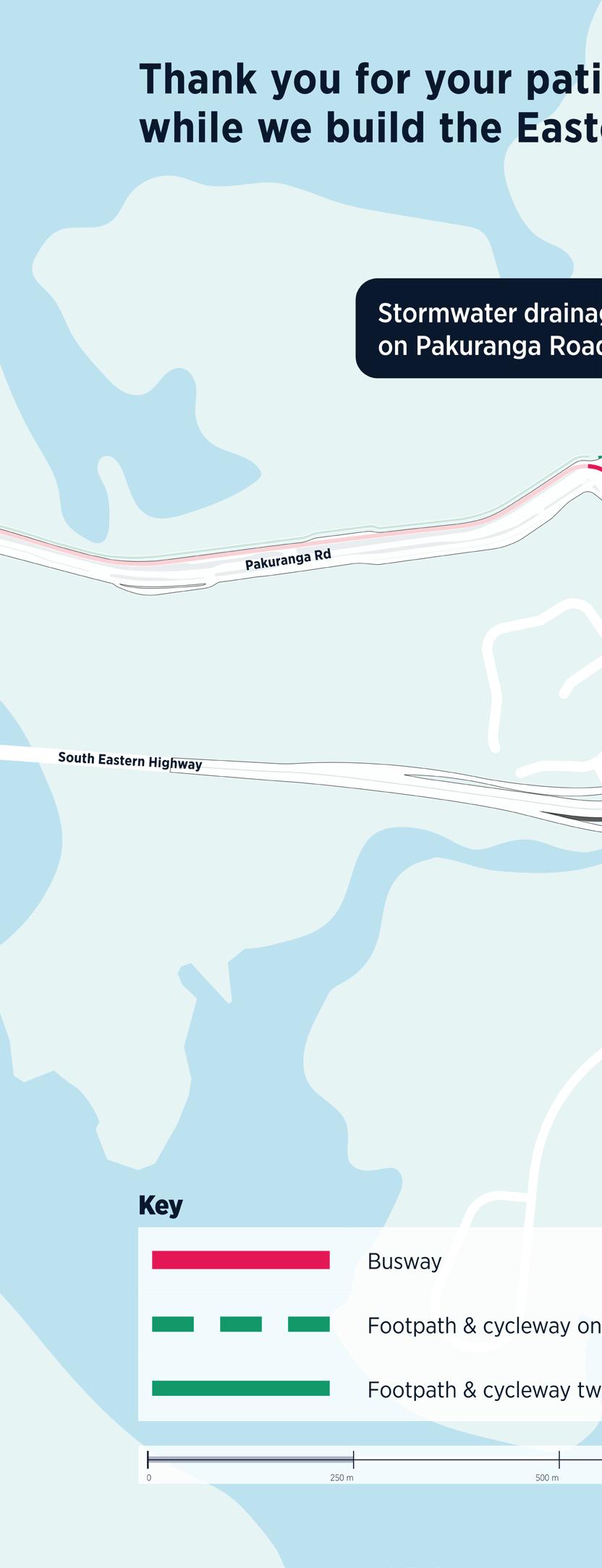
From mid-September 2022, work will take place around Pakuranga to prepare for the Eastern Busway to be built. Construction is scheduled to start in the William Roberts Road area in early 2023.
As part of this preparation, the Eastern Busway Alliance will soon begin deconstructing and removing houses, buildings and trees in Auckland Council owned properties on Ti Rakau Drive (between the South-Eastern Highway and Ti Rakau Drive Bridge), on Seven Oaks Drive and on William Roberts Road.
Removing vacant properties will create space for dedicated bus lanes, cycle lanes, new footpaths, new planting, and the Reeves Road Flyover. The Alliance has been working with current tenants to support them into new accommodation, and many properties are now becoming vacant.
You can expect to see a few changes in the Pakuranga area, including:
• the installation of security fencing around vacant properties and security teams monitoring the properties before removal
• experienced, specialist removal and deconstruction crews ensuring work is carried out safely and efficiently, including the safe handling and disposing of hazardous materials such as asbestos
• work taking place from Monday to Friday between 7am and 6pm, and on Saturdays if required
• use of trucks, diggers, and similar machinery
• noise and dust being managed with care to ensure disruption is minimised
• some temporary road closures at night when properties need to be relocated. Electronic signboards will provide advanced notification of closures
• the set-up of a fenced site laydown area at 169 Pakuranga Road to store construction materials and vehicles.
The project team are mindful that their everyday choices and actions affect the environment, so they are taking steps to ensure they reuse, repurpose and salvage where they can, this includes:
• Relocating a number of suitable properties so they can be used again elsewhere.
• Carefully deconstructing properties to salvage and recycle materials such as kitchen and bathroom units, doors, windows, floors, timber, metals and concrete.
• Deconstruction crews will remove materials for recycling offsite. Some reusable items may be made available to community groups.
• Diverting at least 80% of non-contaminated materials away from landfill.
The Eastern Busway project team thanks the community for joining them at information days in July and August and for providing them with valuable feedback. The team is reviewing all comments to help refine the busway design and construction process. A summary of this feedback will be posted to easternbusway.nz shortly.
For more information, please visit easternbusway.nz or contact the Eastern Busway project team by emailing info@easternbusway.nz or calling 0800 BUSWAY (0800 287 929).

